
understand-r1-zero
Understanding R1-Zero-Like Training: A Critical Perspective
Stars: 777
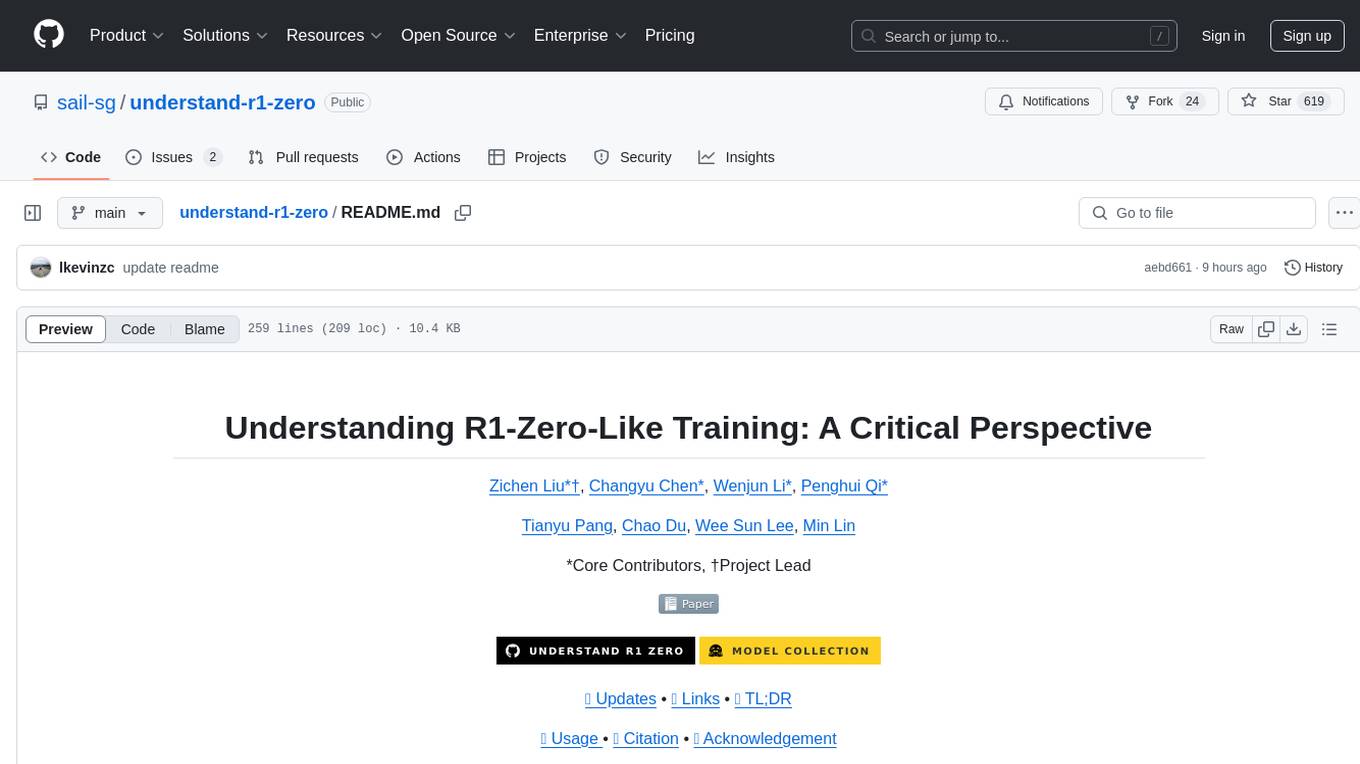
The 'understand-r1-zero' repository focuses on understanding R1-Zero-like training from a critical perspective. It provides insights into base models and reinforcement learning components, highlighting findings and proposing solutions for biased optimization. The repository offers a minimalist recipe for R1-Zero training, detailing the RL-tuning process and achieving state-of-the-art performance with minimal compute resources. It includes codebase, models, and paper related to R1-Zero training implemented with the Oat framework, emphasizing research-friendly and efficient LLM RL techniques.
README:
Zichen Liu*†, Changyu Chen*, Wenjun Li*, Penghui Qi*
Tianyu Pang, Chao Du, Wee Sun Lee, Min Lin
*Core Contributors, †Project Lead
- 21/03/2025: 🎉 We release our paper, models and codebase. Our R1-Zero training is implemented with 🌾 Oat, a highly modular, research-friendly and efficient LLM RL framework.
-
Understanding R1-Zero-Like Training: A Critical Perspective
- 📄 Paper
- 🤗 Models
- 🚀 Release tweet
-
There May Not Be Aha Moment in R1-Zero-like Training — A Pilot Study
- 📄 Blog
- 💻 Code
- 🚀 Release tweet
-
OAT: A research-friendly framework for LLM online alignment
- 💻 Codebase
To understand R1-Zero-like training, we critically examine two core components: base models and reinforcement learning. We highlight our findings below.
- DeepSeek-V3-Base already exhibit "Aha moment".
- As the popular choice for R1-Zero-like training, Qwen2.5 base models demonstrate strong reasoning capabilities even without prompt templates: the average benchmark scores improve by ~60% (compared to the traditional 4-shot prompting)!
- GRPO leads to biased optimization! We propose a simple fix that improves token efficiency while maintaining reasoning performance, termed as Dr. GRPO (GRPO Done Right).
- In R1-Zero-like training, the template and the question set perform a duet to affect the RL dynamics
- (Left Plot) For Qwen2.5-Math-1.5B, a mismatched template (e.g., R1 template) in fact destroys the reasoning capabilities before RL reconstructing it. This makes the improvement impressive on the surface.
- (Middle Plot) However, if a template does not deviate from the pretraining distribution too far, even a small and completely o.o.d. question set (e.g., GSM8K) could induce the reasoning ability equally well, by reinforcing correct reasoning behaviors instead of infusing new knowledge.
- Beyond Qwen, Llama can also be RL-tuned from base models. In this case, domain-specific pretraining will improves RL ceiling.
- (Right Plot) GRPO can even make Llama with math knowledge "Aha" by increasing the output length; however, it is likely due to its length bias, which can be removed by Dr. GRPO.
Our analysis suggests a minimalist recipe for R1-Zero-like training:
We RL-tune Qwen2.5- Math-7B using the (unbiased) Dr. GRPO algorithm on MATH level 3-5 questions with the Qwen-Math template, and achieve state-of-the-art performance with only 27 hours compute on 8× A100 GPUs.
If you are interested in more details, please check out our paper!
We recommend a clean python==3.10 environment for development.
# Install vllm & oat, the LLM RL framework we developed r1-zero training on.
pip install vllm==0.7.2 && pip install oat-llm==0.0.9
# Install this package locally to use the math grader.
git clone [email protected]:sail-sg/understand-r1-zero.git && cd understand-r1-zero
pip install -e .We implement R1-Zero training by extending Oat's Learner and Actor components. Please see train_zero_math.py for a step-by-step guide.
# Patch LD_LIBRARY_PATH to avoid dependency errors:
export LD_LIBRARY_PATH=$(python -c "import sysconfig; print(sysconfig.get_config_var('LIBDIR'))"):$LD_LIBRARY_PATH
# Run the experiment (tested on 8 x A100-40G) with Dr. GRPO:
# (change to `--critic_type grpo` for running GRPO)
python train_zero_math.py \
--critic_type drgrpo \
--gpus 8 \
--enable_prefix_caching \
--collocate \
--vllm_sleep \
--vllm_gpu_ratio 0.35 \
--gradient-checkpointing \
--flash-attn \
--bf16 \
--rnd-seed \
--learning_rate 0.000001 \
--lr_scheduler constant \
--num_ppo_epochs 1 \
--beta 0 \
--oracle_type reward \
--oracle math \
--pretrain Qwen/Qwen2.5-Math-1.5B \
--prompt_template r1 \
--zero-stage 2 \
--ref_offload \
--prompt_data ./datasets/train/math_12k \
--train_split train \
--input_key problem \
--output_key answer \
--max-train 9999999 \
--num_prompt_epoch 20 \
--prompt_max_length 1024 \
--num_samples 8 \
--temperature 1 \
--top_p 1 \
--generate_max_length 3000 \
--save_steps -1 \
--train_batch_size 128 \
--train_batch_size_per_device 1 \
--mini_train_batch_size_per_device 1 \
--rollout_batch_size 128 \
--rollout_batch_size_per_device 16 \
--pi_buffer_maxlen_per_device 128 \
--eval_batch_size 200 \
--eval_steps 16 \
--eval_temperature 0 \
--eval_generate_max_length 3000 \
--eval_data ./datasets/evaluation_suite \
--eval_input_key input \
--use-wb \
--wb-run-name qwen2.5-Math-1.5b-r1-zero \
--wb_project oat-zeroPlease see here for more example scripts.
# Evaluate our models:
python evaluate_model.py --model_name sail/Qwen2.5-Math-7B-Oat-Zero
python evaluate_model.py --model_name sail/Qwen2.5-Math-1.5B-Oat-Zero
python evaluate_model.py --model_name sail/Llama-3.2-3B-Oat-Zero --template r1
# Evaluate baseline models:
python evaluate_model.py --model_name Qwen/Qwen2.5-Math-1.5B
python evaluate_model.py --model_name Qwen/Qwen2.5-Math-7B
python evaluate_model.py --model_name hkust-nlp/Qwen-2.5-Math-7B-SimpleRL-Zero
python evaluate_model.py --model_name PRIME-RL/Eurus-2-7B-PRIME-Zero
python evaluate_model.py --model_name Open-Reasoner-Zero/Open-Reasoner-Zero-7BWe provide a script to serve DeepSeek-V3-Base and DeepSeek-R1-Zero on k8s cluster.
# prerequisites:
# 1. download the model weights
# 2. starting a k8s job with sglang docker image "lmsysorg/sglang:v0.4.3.post2-cu125"
# start the server:
bash deploy_dpsk/serving.sh <model_name> <num_nodes>Example of API call:
from openai import OpenAI
# MASTER_ADDR is the environment variable set by the k8s job
api_base = "http://{MASTER_ADDR}:30000/v1"
api_key = "EMPTY"
client = OpenAI(
api_key=api_key,
base_url=api_base,
)
# send requests to the server ...Notes:
- Your k8s container should have environment variable
MASTER_ADDRandMASTER_PORTset. - Hardware requirements:
2 x 8 x H100/800/20for FP8 and4 x 8 x A100/A800for BF16. - Please refer to sglang's official tutorial for more details.
If you find our works useful for your research, please consider citing:
-
This paper:
@article{liu2025understanding, title={Understanding R1-Zero-Like Training: A Critical Perspective}, author={Zichen Liu and Changyu Chen and Wenjun Li and Penghui Qi and Tianyu Pang and Chao Du and Wee Sun Lee and Min Lin}, journal={arXiv preprint arXiv:2503.20783}, year={2025} }
-
Our blog that conducted the first investigation on the "Aha moment":
@misc{liu2025there, title={There May Not be Aha Moment in R1-Zero-like Training — A Pilot Study}, author={Zichen Liu and Changyu Chen and Wenjun Li and Tianyu Pang and Chao Du and Min Lin}, year={2025}, howpublished={\url{https://oatllm.notion.site/oat-zero}}, note={Notion Blog}, }
-
The training framework:
@misc{liu2025oat, title={OAT: A research-friendly framework for LLM online alignment}, author={Zichen Liu and Changyu Chen and Chao Du and Wee Sun Lee and Min Lin}, year={2025} howpublished={\url{https://github.com/sail-sg/oat}}, }
- This work is supported by Sea AI Lab for computing resources.
- The training codes are built on Oat, which employs vLLM, DeepSpeed and launchpad. We serve DeepSeek models using SGLang.
- The base models are from Qwen2.5-Math, Llama, and DeepSeek.
- We thank Qingfeng Lan for his time in thoroughly reviewing our code.
For Tasks:
Click tags to check more tools for each tasksFor Jobs:
Alternative AI tools for understand-r1-zero
Similar Open Source Tools

understand-r1-zero
The 'understand-r1-zero' repository focuses on understanding R1-Zero-like training from a critical perspective. It provides insights into base models and reinforcement learning components, highlighting findings and proposing solutions for biased optimization. The repository offers a minimalist recipe for R1-Zero training, detailing the RL-tuning process and achieving state-of-the-art performance with minimal compute resources. It includes codebase, models, and paper related to R1-Zero training implemented with the Oat framework, emphasizing research-friendly and efficient LLM RL techniques.
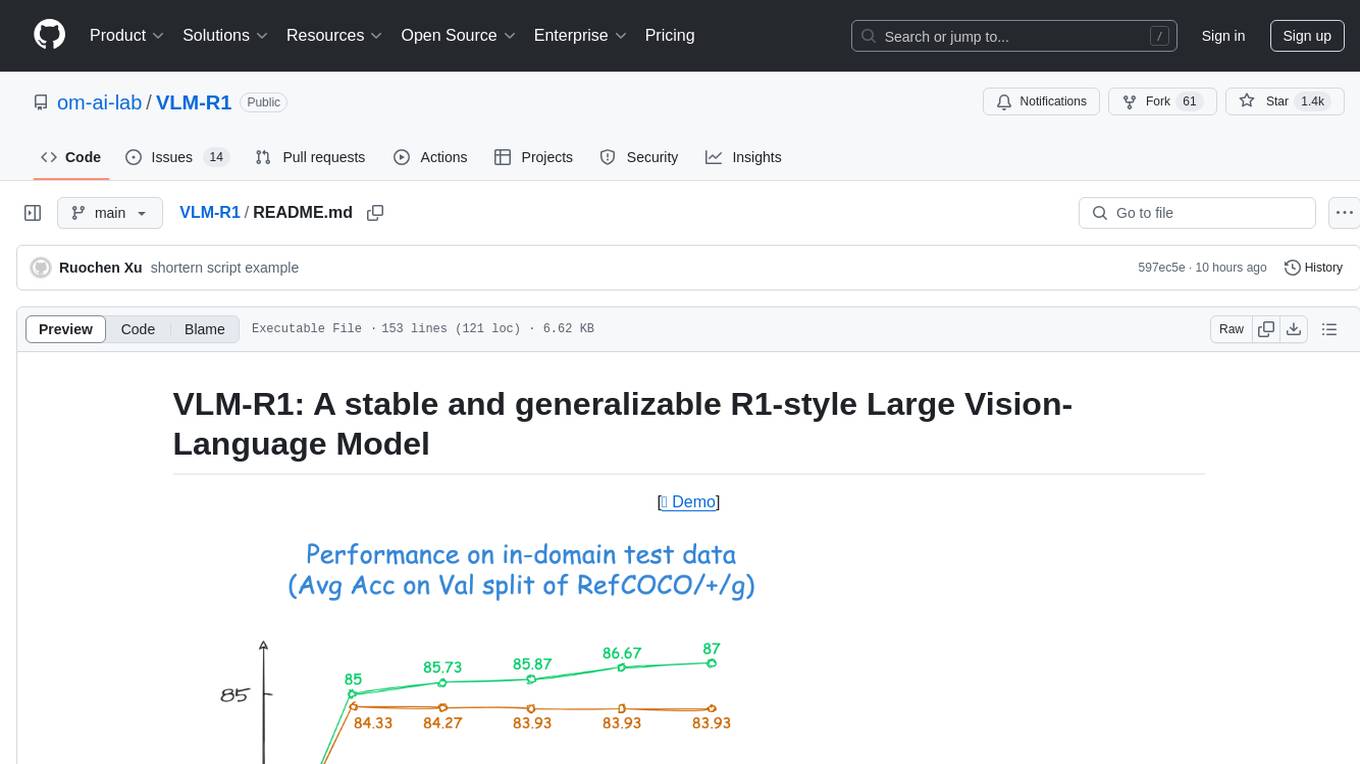
VLM-R1
VLM-R1 is a stable and generalizable R1-style Large Vision-Language Model proposed for Referring Expression Comprehension (REC) task. It compares R1 and SFT approaches, showing R1 model's steady improvement on out-of-domain test data. The project includes setup instructions, training steps for GRPO and SFT models, support for user data loading, and evaluation process. Acknowledgements to various open-source projects and resources are mentioned. The project aims to provide a reliable and versatile solution for vision-language tasks.
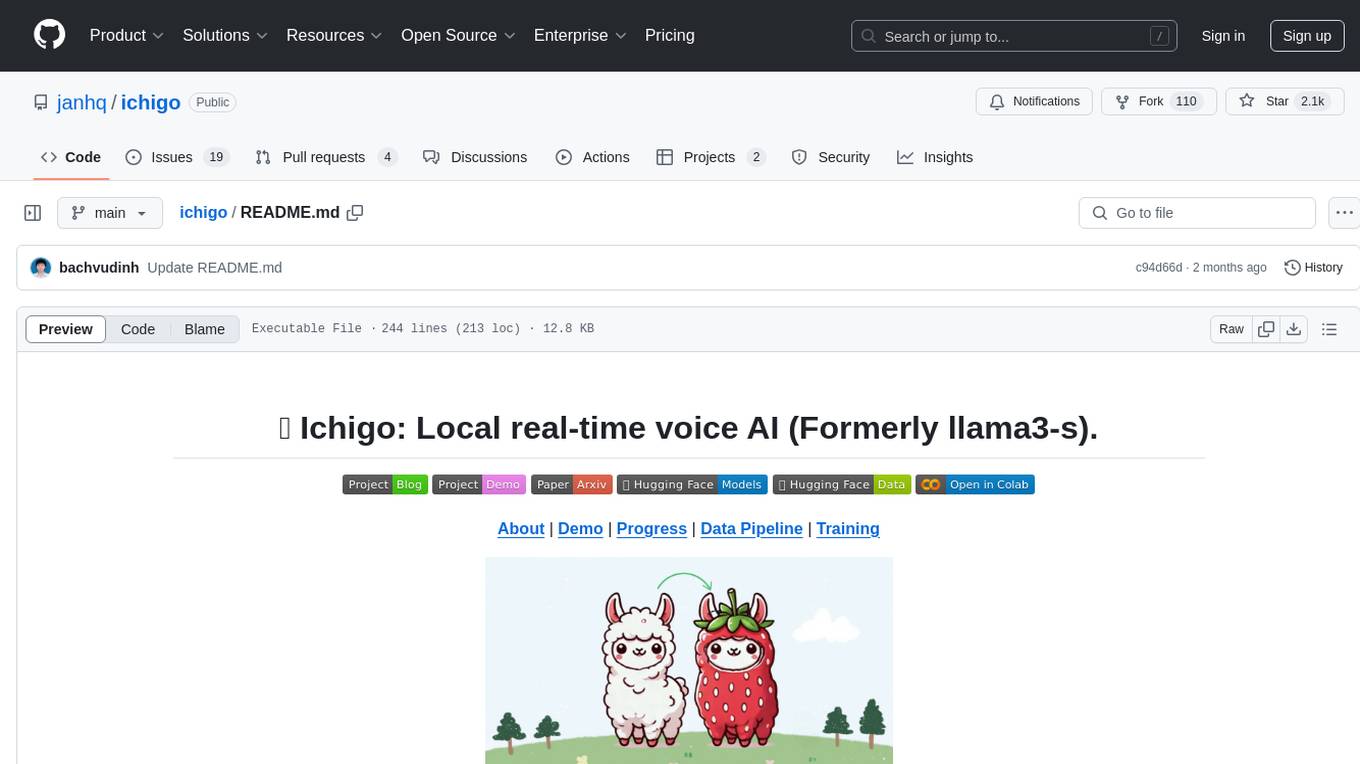
ichigo
Ichigo is a local real-time voice AI tool that uses an early fusion technique to extend a text-based LLM to have native 'listening' ability. It is an open research experiment with improved multiturn capabilities and the ability to refuse processing inaudible queries. The tool is designed for open data, open weight, on-device Siri-like functionality, inspired by Meta's Chameleon paper. Ichigo offers a web UI demo and Gradio web UI for users to interact with the tool. It has achieved enhanced MMLU scores, stronger context handling, advanced noise management, and improved multi-turn capabilities for a robust user experience.
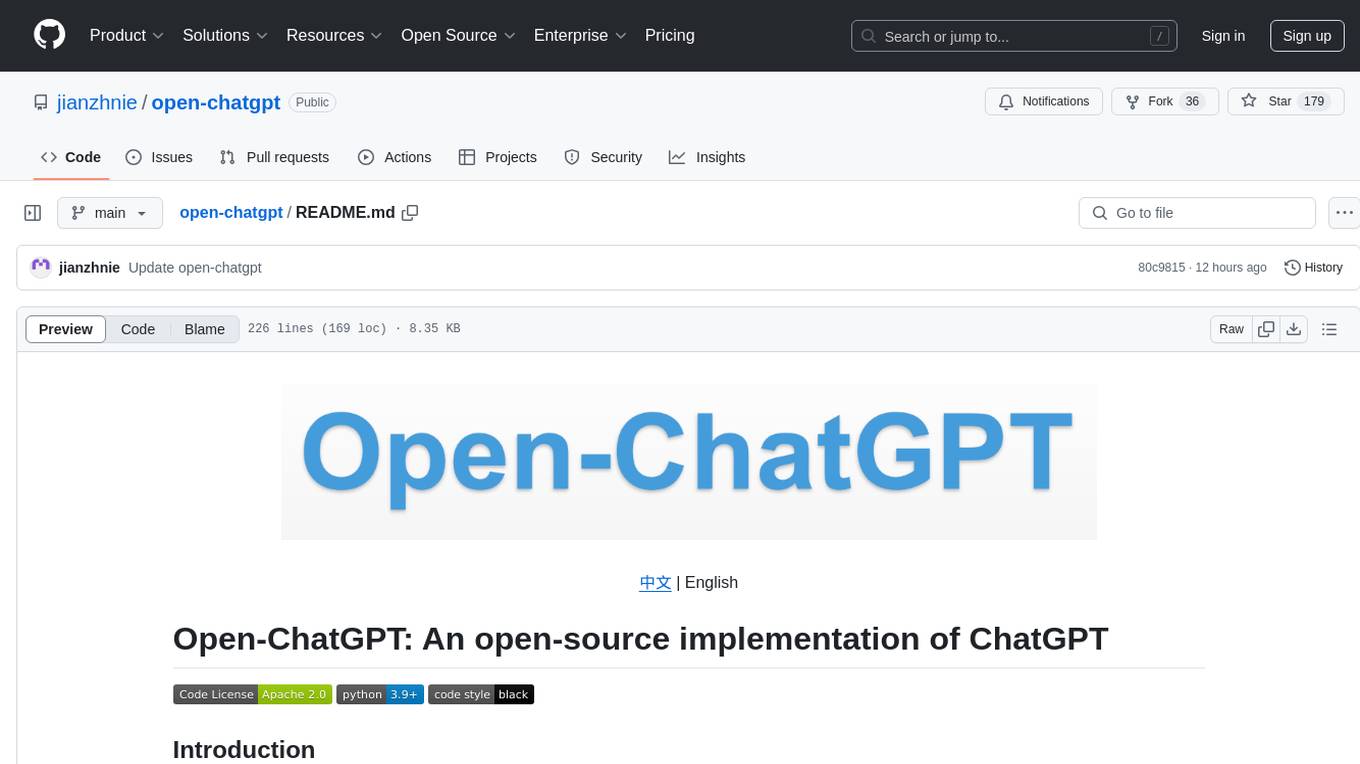
open-chatgpt
Open-ChatGPT is an open-source library that enables users to train a hyper-personalized ChatGPT-like AI model using their own data with minimal computational resources. It provides an end-to-end training framework for ChatGPT-like models, supporting distributed training and offloading for extremely large models. The project implements RLHF (Reinforcement Learning with Human Feedback) powered by transformer library and DeepSpeed, allowing users to create high-quality ChatGPT-style models. Open-ChatGPT is designed to be user-friendly and efficient, aiming to empower users to develop their own conversational AI models easily.
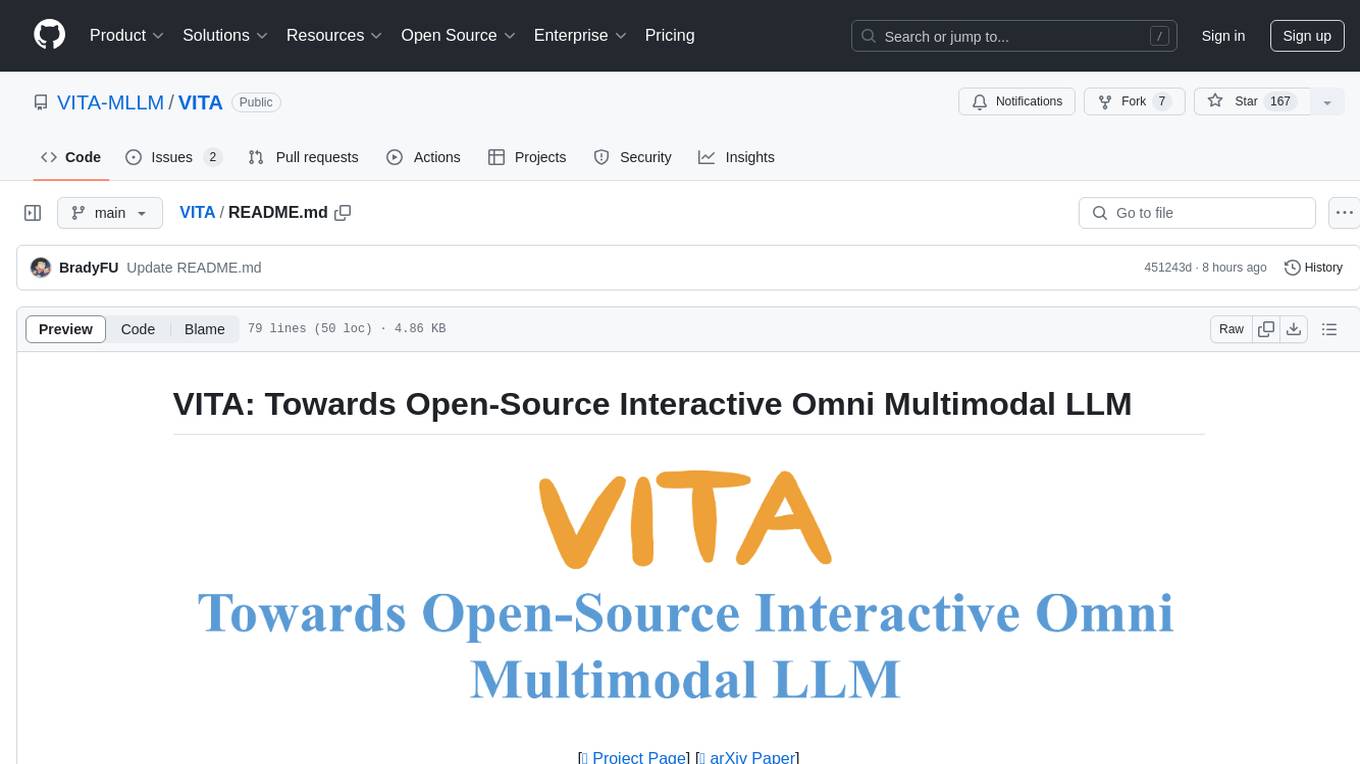
VITA
VITA is an open-source interactive omni multimodal Large Language Model (LLM) capable of processing video, image, text, and audio inputs simultaneously. It stands out with features like Omni Multimodal Understanding, Non-awakening Interaction, and Audio Interrupt Interaction. VITA can respond to user queries without a wake-up word, track and filter external queries in real-time, and handle various query inputs effectively. The model utilizes state tokens and a duplex scheme to enhance the multimodal interactive experience.
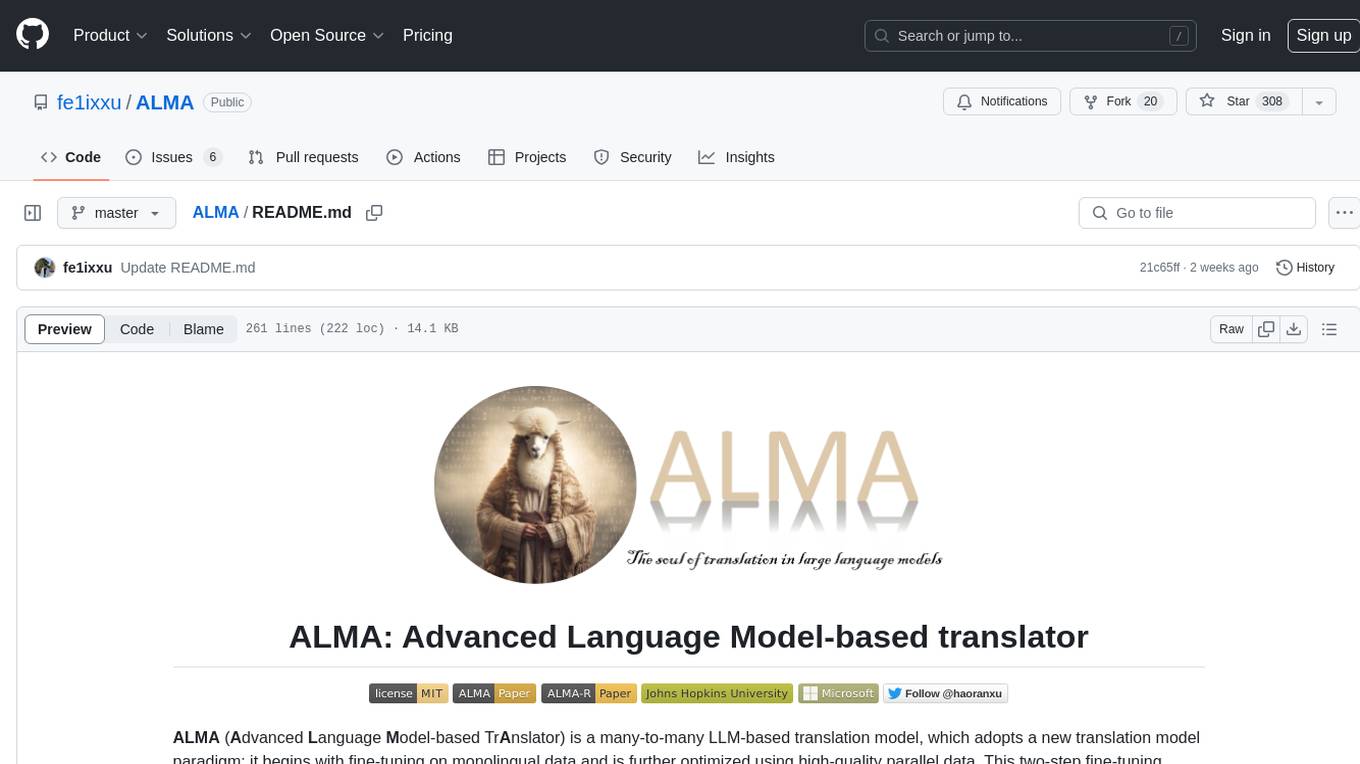
ALMA
ALMA (Advanced Language Model-based Translator) is a many-to-many LLM-based translation model that utilizes a two-step fine-tuning process on monolingual and parallel data to achieve strong translation performance. ALMA-R builds upon ALMA models with LoRA fine-tuning and Contrastive Preference Optimization (CPO) for even better performance, surpassing GPT-4 and WMT winners. The repository provides ALMA and ALMA-R models, datasets, environment setup, evaluation scripts, training guides, and data information for users to leverage these models for translation tasks.
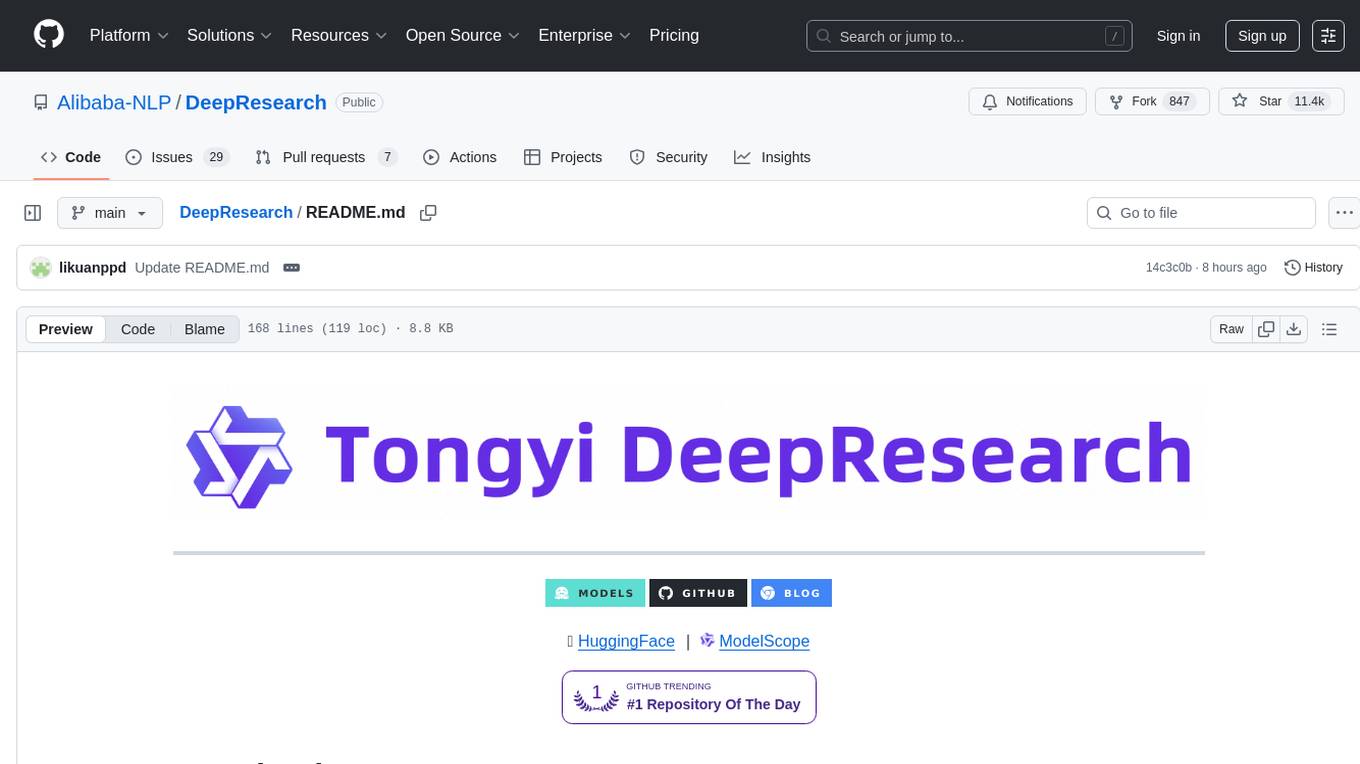
DeepResearch
Tongyi DeepResearch is an agentic large language model with 30.5 billion total parameters, designed for long-horizon, deep information-seeking tasks. It demonstrates state-of-the-art performance across various search benchmarks. The model features a fully automated synthetic data generation pipeline, large-scale continual pre-training on agentic data, end-to-end reinforcement learning, and compatibility with two inference paradigms. Users can download the model directly from HuggingFace or ModelScope. The repository also provides benchmark evaluation scripts and information on the Deep Research Agent Family.
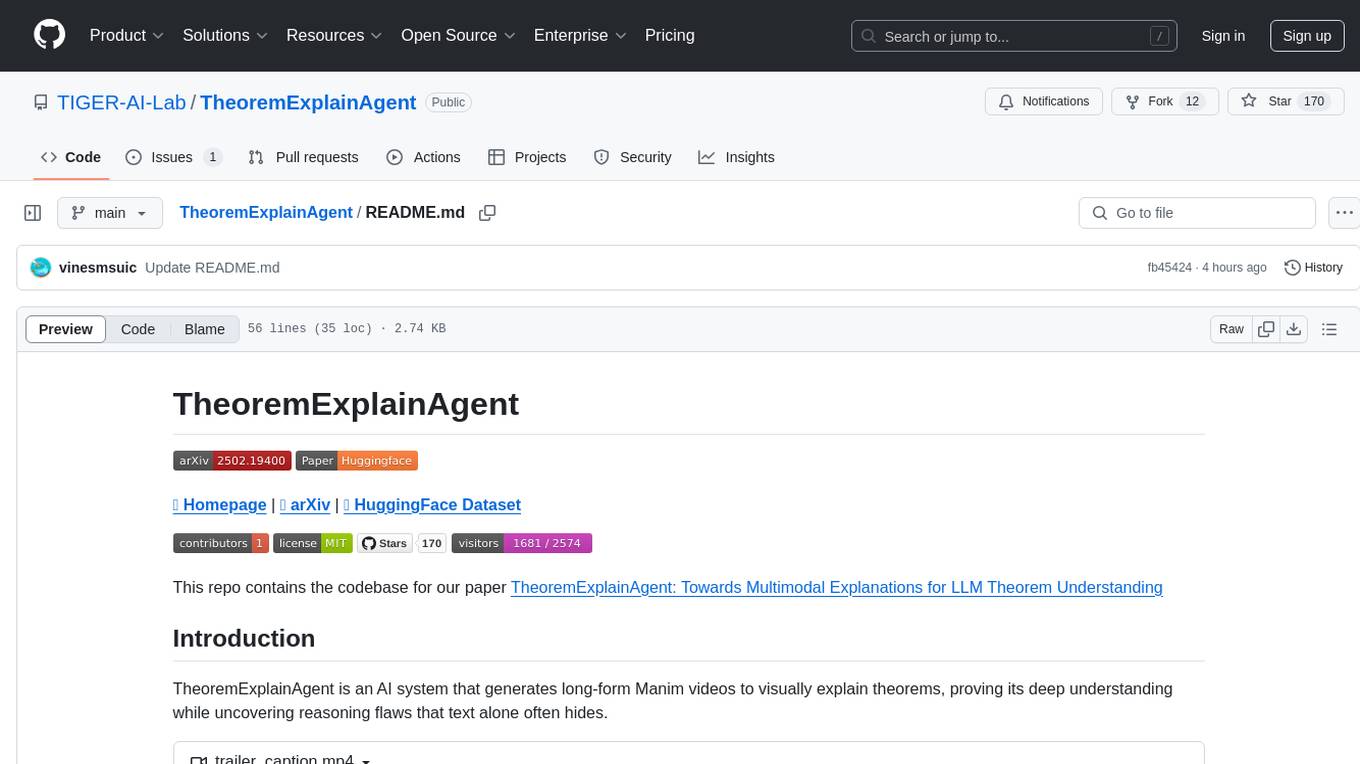
TheoremExplainAgent
TheoremExplainAgent is an AI system that generates long-form Manim videos to visually explain theorems, proving its deep understanding while uncovering reasoning flaws that text alone often hides. The codebase for the paper 'TheoremExplainAgent: Towards Multimodal Explanations for LLM Theorem Understanding' is available in this repository. It provides a tool for creating multimodal explanations for theorem understanding using AI technology.
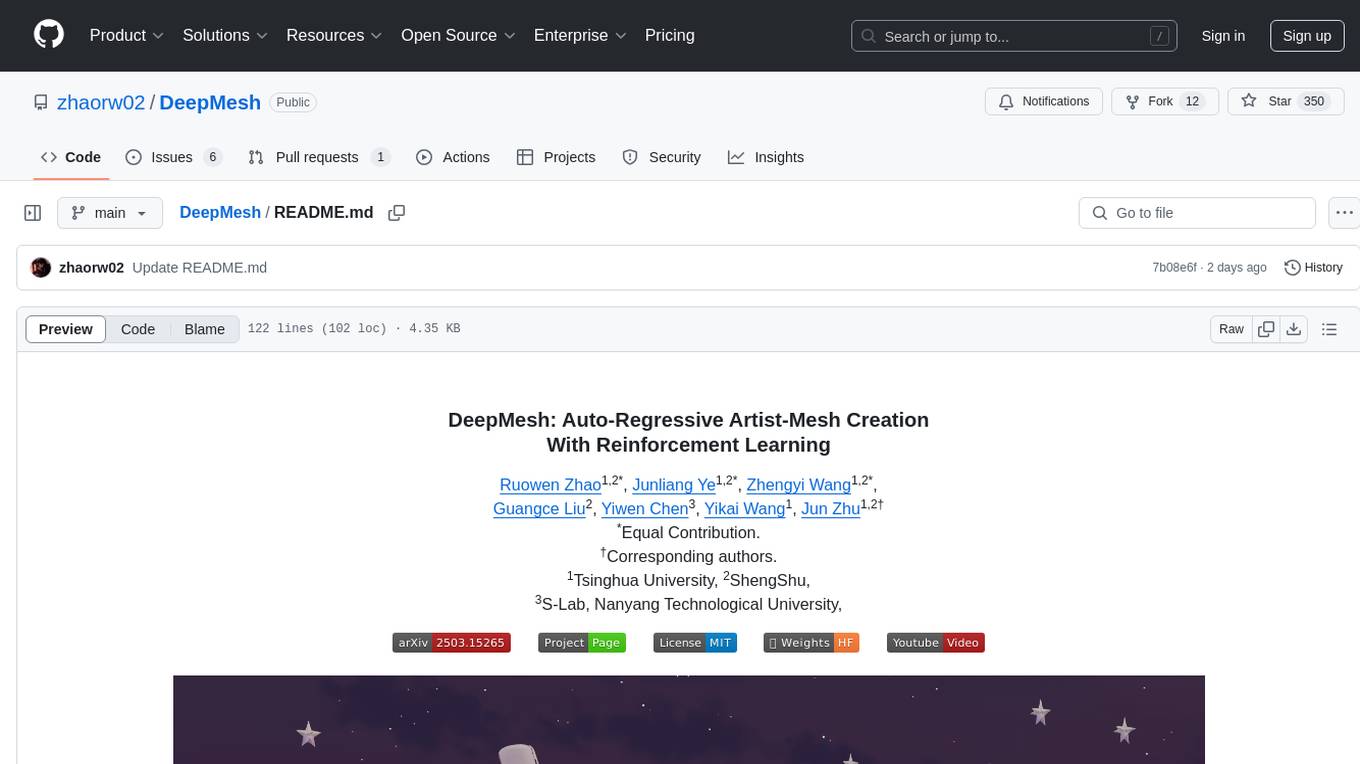
DeepMesh
DeepMesh is an auto-regressive artist-mesh creation tool that utilizes reinforcement learning to generate high-quality meshes conditioned on a given point cloud. It offers pretrained weights and allows users to generate obj/ply files based on specific input parameters. The tool has been tested on Ubuntu 22 with CUDA 11.8 and supports A100, A800, and A6000 GPUs. Users can clone the repository, create a conda environment, install pretrained model weights, and use command line inference to generate meshes.
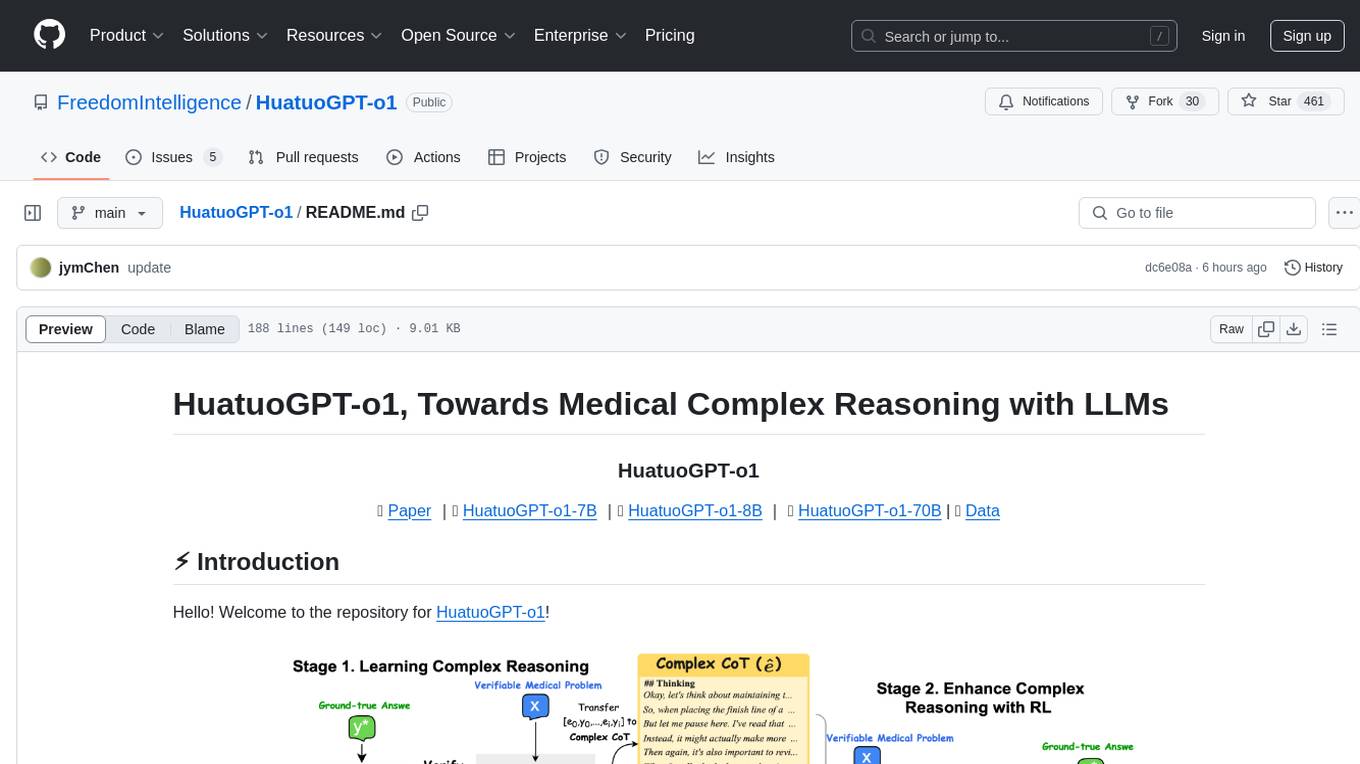
HuatuoGPT-o1
HuatuoGPT-o1 is a medical language model designed for advanced medical reasoning. It can identify mistakes, explore alternative strategies, and refine answers. The model leverages verifiable medical problems and a specialized medical verifier to guide complex reasoning trajectories and enhance reasoning through reinforcement learning. The repository provides access to models, data, and code for HuatuoGPT-o1, allowing users to deploy the model for medical reasoning tasks.
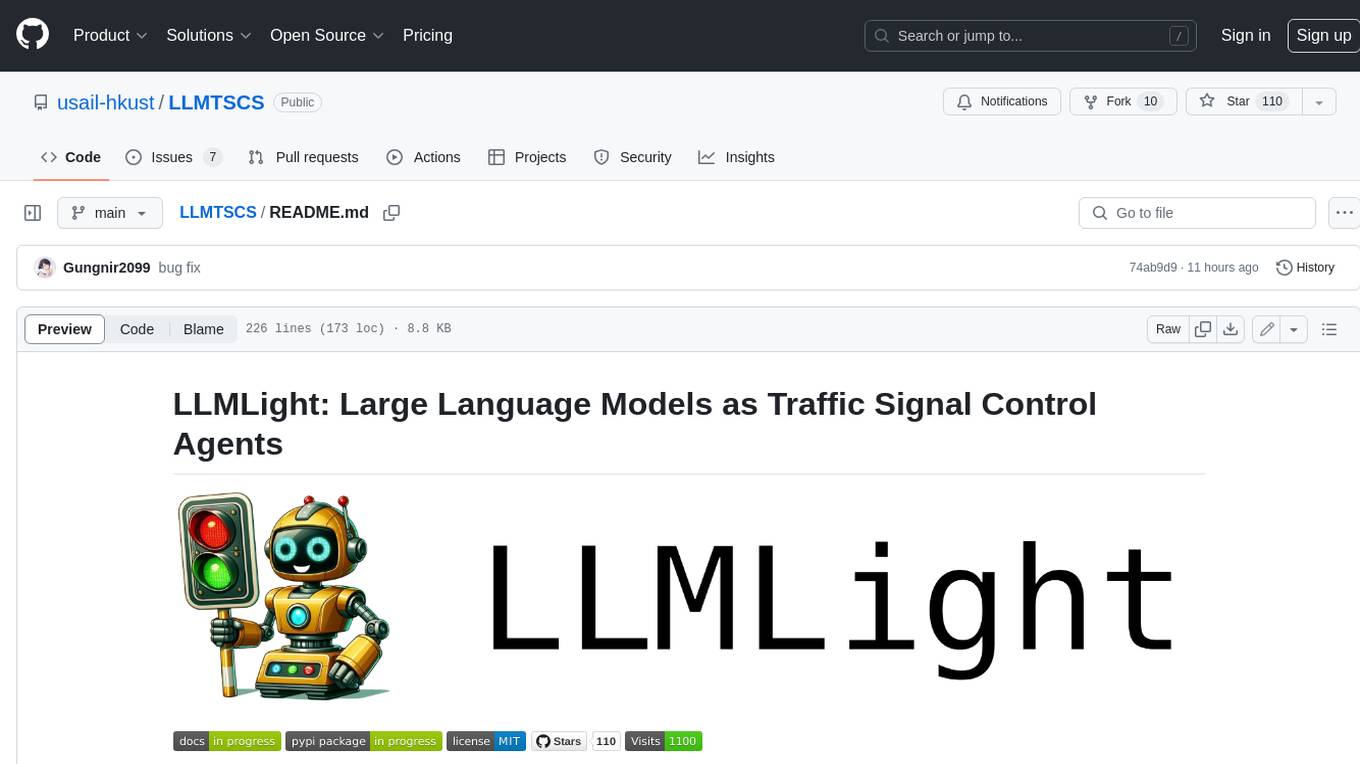
LLMTSCS
LLMLight is a novel framework that employs Large Language Models (LLMs) as decision-making agents for Traffic Signal Control (TSC). The framework leverages the advanced generalization capabilities of LLMs to engage in a reasoning and decision-making process akin to human intuition for effective traffic control. LLMLight has been demonstrated to be remarkably effective, generalizable, and interpretable against various transportation-based and RL-based baselines on nine real-world and synthetic datasets.
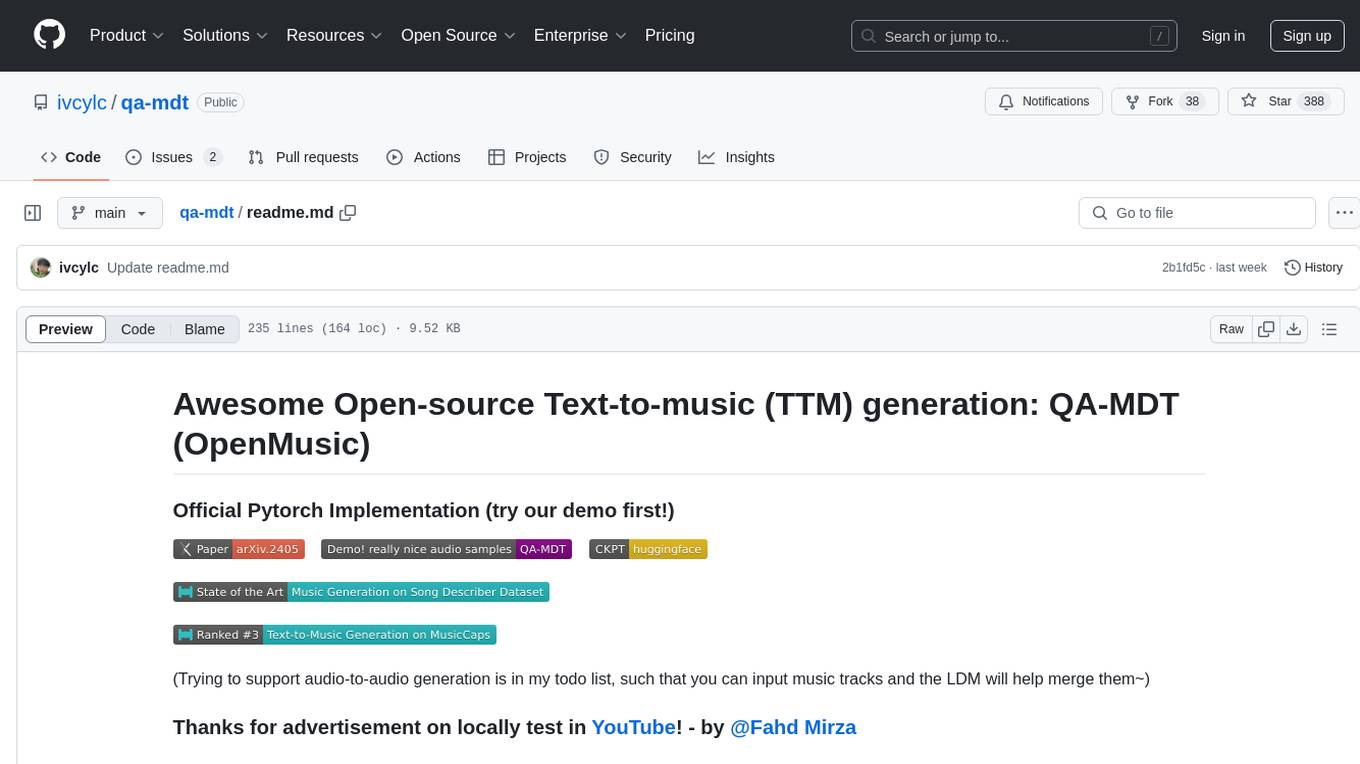
qa-mdt
This repository provides an implementation of QA-MDT, integrating state-of-the-art models for music generation. It offers a Quality-Aware Masked Diffusion Transformer for enhanced music generation. The code is based on various repositories like AudioLDM, PixArt-alpha, MDT, AudioMAE, and Open-Sora. The implementation allows for training and fine-tuning the model with different strategies and datasets. The repository also includes instructions for preparing datasets in LMDB format and provides a script for creating a toy LMDB dataset. The model can be used for music generation tasks, with a focus on quality injection to enhance the musicality of generated music.
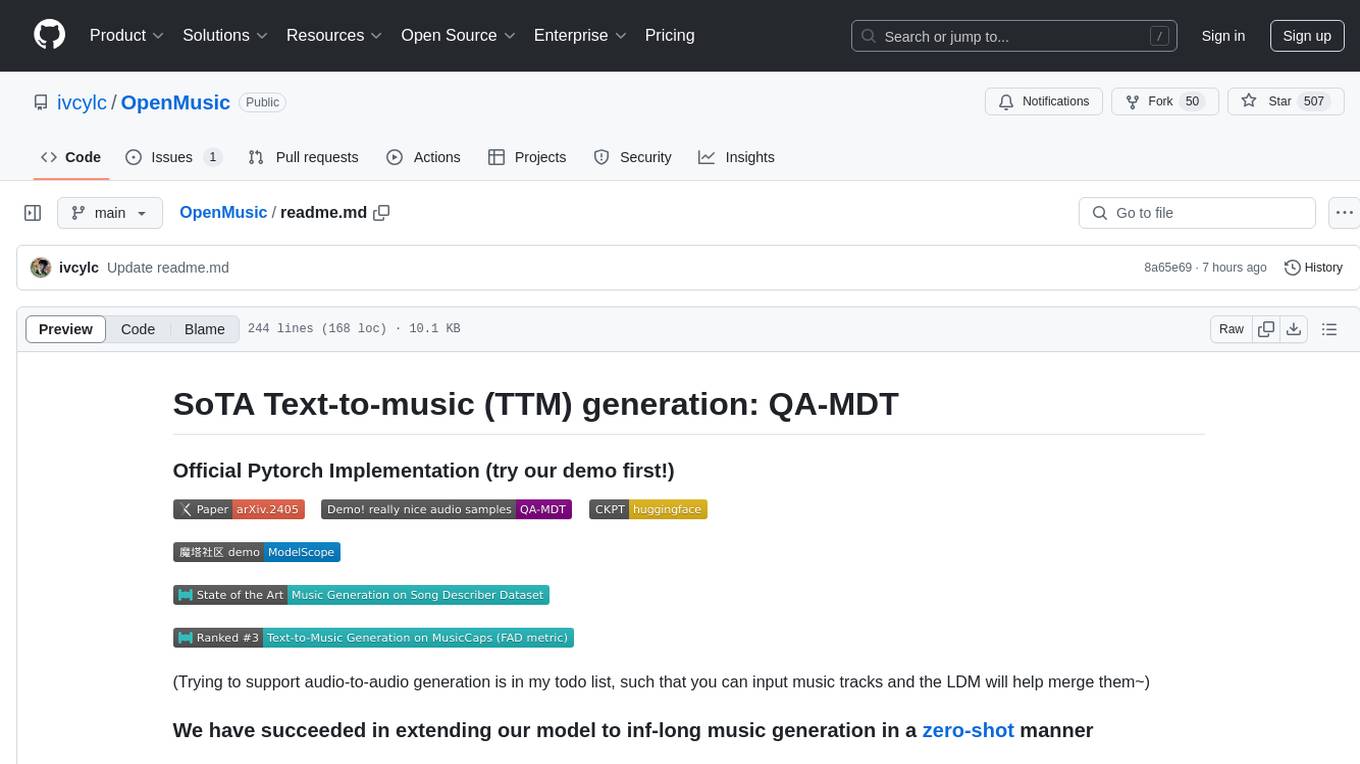
OpenMusic
OpenMusic is a repository providing an implementation of QA-MDT, a Quality-Aware Masked Diffusion Transformer for music generation. The code integrates state-of-the-art models and offers training strategies for music generation. The repository includes implementations of AudioLDM, PixArt-alpha, MDT, AudioMAE, and Open-Sora. Users can train or fine-tune the model using different strategies and datasets. The model is well-pretrained and can be used for music generation tasks. The repository also includes instructions for preparing datasets, training the model, and performing inference. Contact information is provided for any questions or suggestions regarding the project.
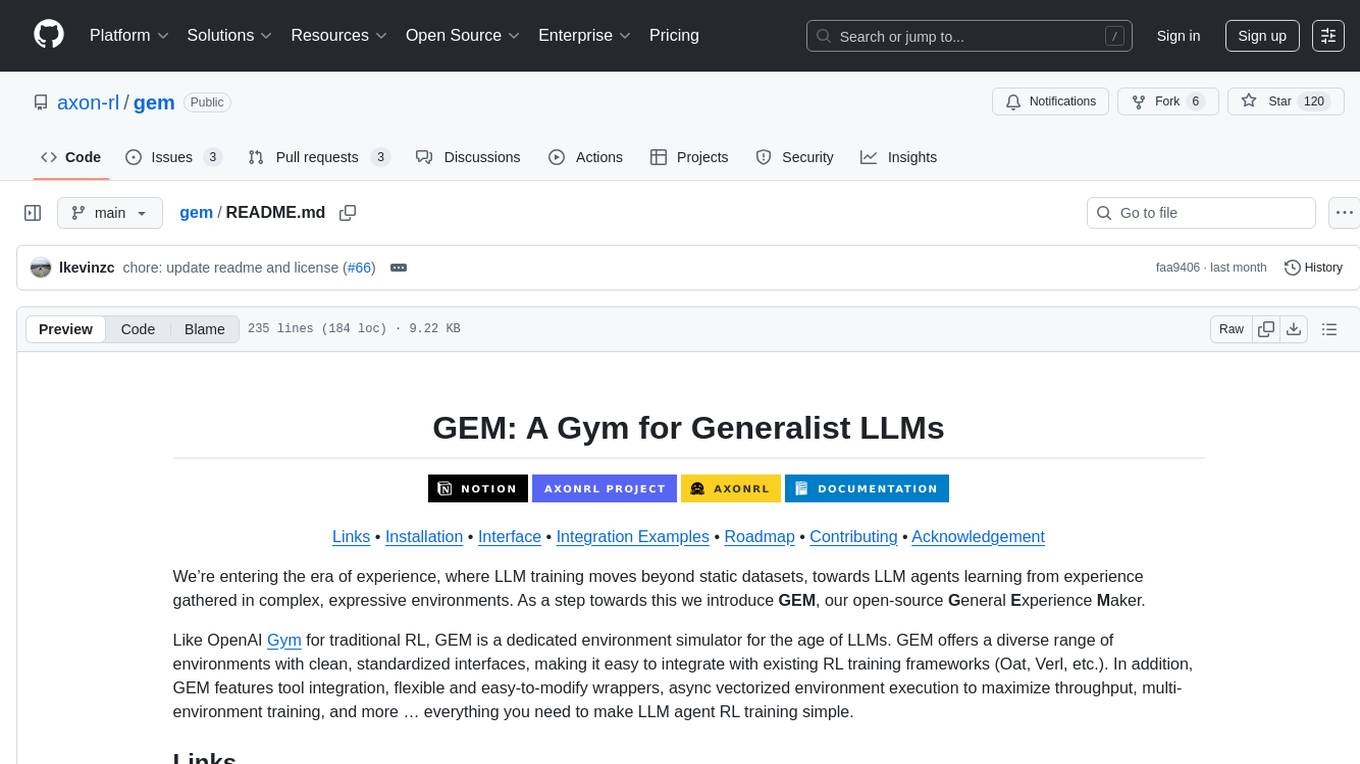
gem
GEM is an open-source General Experience Maker designed for training Large Language Models (LLMs) in dynamic environments. Similar to OpenAI Gym for traditional Reinforcement Learning, GEM provides a variety of environments with standardized interfaces for seamless integration with existing LLM training frameworks. It offers tool integration, flexible wrappers, async vectorized environment execution, multi-environment training, and more to simplify LLM agent training.
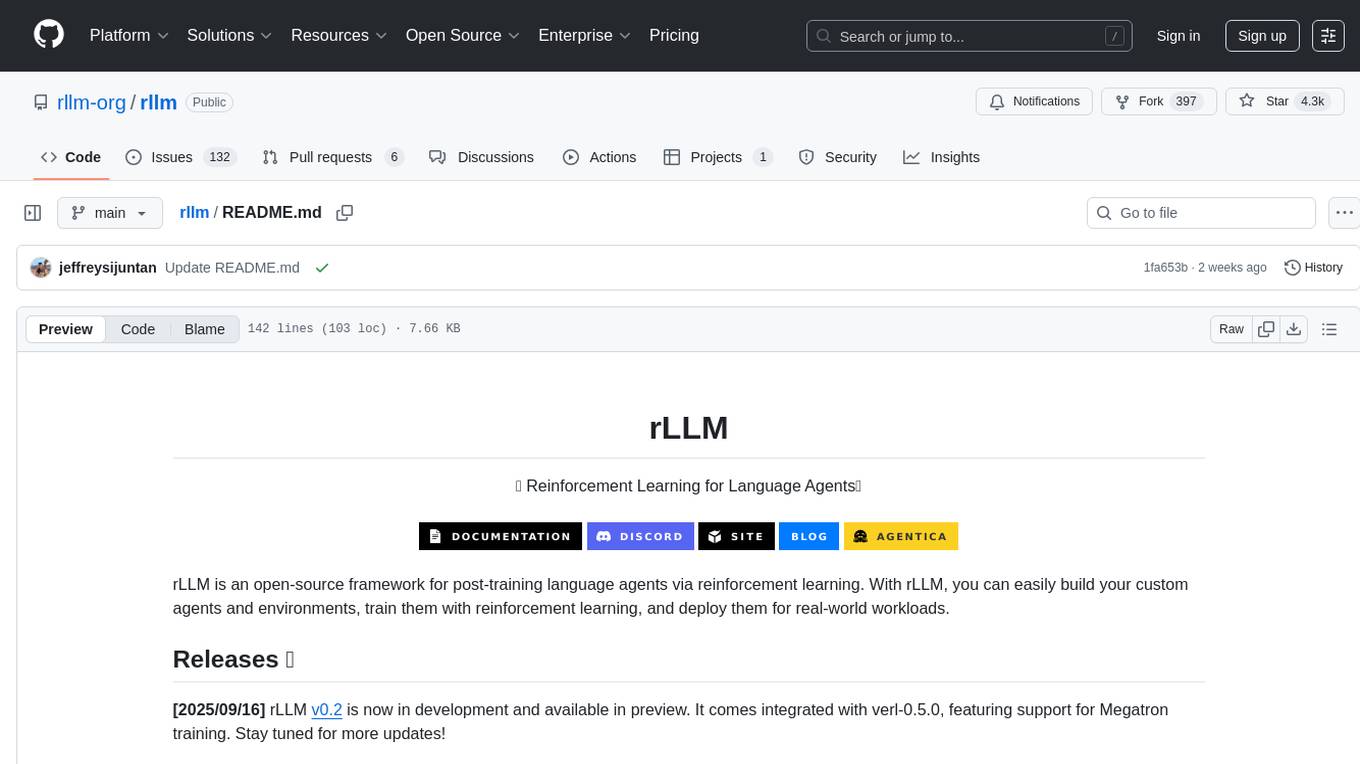
rllm
rLLM is an open-source framework for post-training language agents via reinforcement learning. With rLLM, you can easily build your custom agents and environments, train them with reinforcement learning, and deploy them for real-world workloads. The framework provides tools for training coding models, software engineering agents, and language agents using reinforcement learning techniques. It supports various models of different sizes and capabilities, enabling users to achieve state-of-the-art performance in coding and language-related tasks. rLLM is designed to be user-friendly, scalable, and efficient for training and deploying language agents in diverse applications.
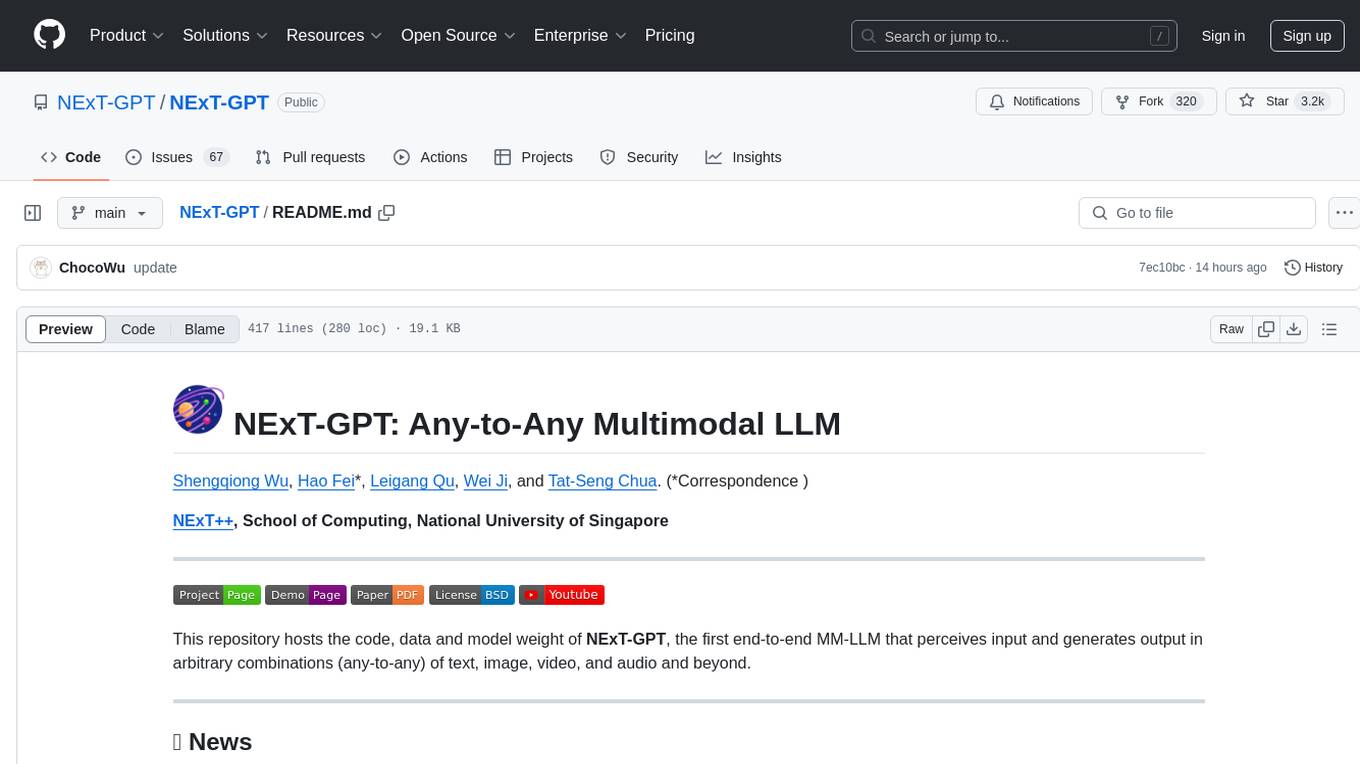
NExT-GPT
NExT-GPT is an end-to-end multimodal large language model that can process input and generate output in various combinations of text, image, video, and audio. It leverages existing pre-trained models and diffusion models with end-to-end instruction tuning. The repository contains code, data, and model weights for NExT-GPT, allowing users to work with different modalities and perform tasks like encoding, understanding, reasoning, and generating multimodal content.
For similar tasks

understand-r1-zero
The 'understand-r1-zero' repository focuses on understanding R1-Zero-like training from a critical perspective. It provides insights into base models and reinforcement learning components, highlighting findings and proposing solutions for biased optimization. The repository offers a minimalist recipe for R1-Zero training, detailing the RL-tuning process and achieving state-of-the-art performance with minimal compute resources. It includes codebase, models, and paper related to R1-Zero training implemented with the Oat framework, emphasizing research-friendly and efficient LLM RL techniques.
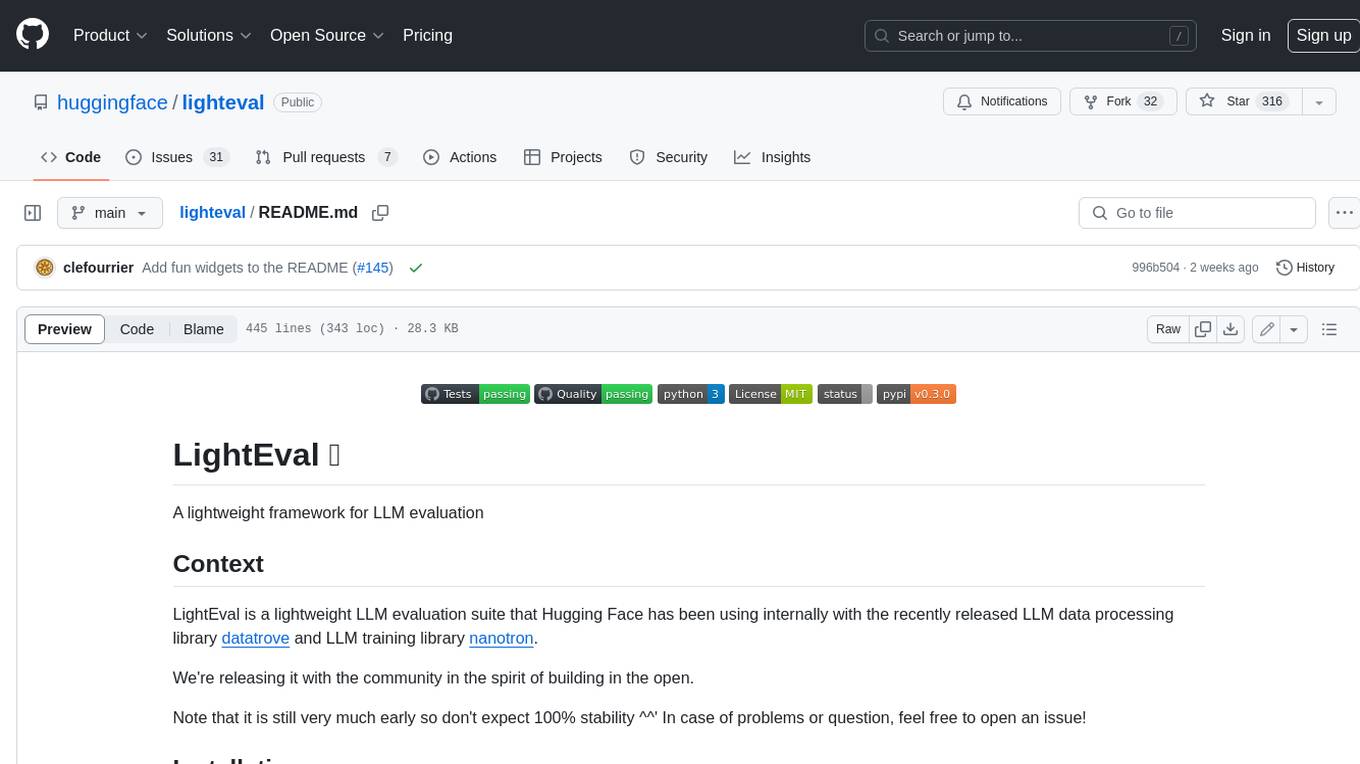
lighteval
LightEval is a lightweight LLM evaluation suite that Hugging Face has been using internally with the recently released LLM data processing library datatrove and LLM training library nanotron. We're releasing it with the community in the spirit of building in the open. Note that it is still very much early so don't expect 100% stability ^^' In case of problems or question, feel free to open an issue!
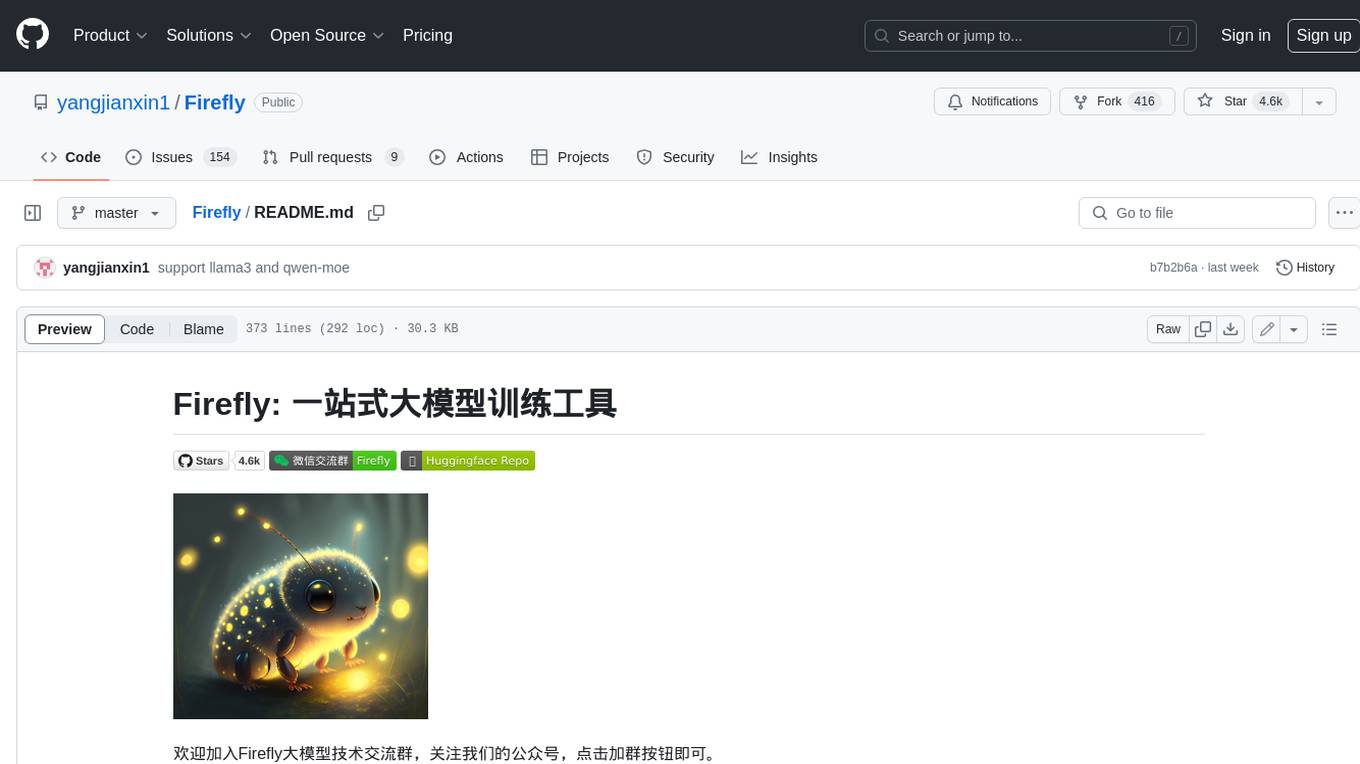
Firefly
Firefly is an open-source large model training project that supports pre-training, fine-tuning, and DPO of mainstream large models. It includes models like Llama3, Gemma, Qwen1.5, MiniCPM, Llama, InternLM, Baichuan, ChatGLM, Yi, Deepseek, Qwen, Orion, Ziya, Xverse, Mistral, Mixtral-8x7B, Zephyr, Vicuna, Bloom, etc. The project supports full-parameter training, LoRA, QLoRA efficient training, and various tasks such as pre-training, SFT, and DPO. Suitable for users with limited training resources, QLoRA is recommended for fine-tuning instructions. The project has achieved good results on the Open LLM Leaderboard with QLoRA training process validation. The latest version has significant updates and adaptations for different chat model templates.
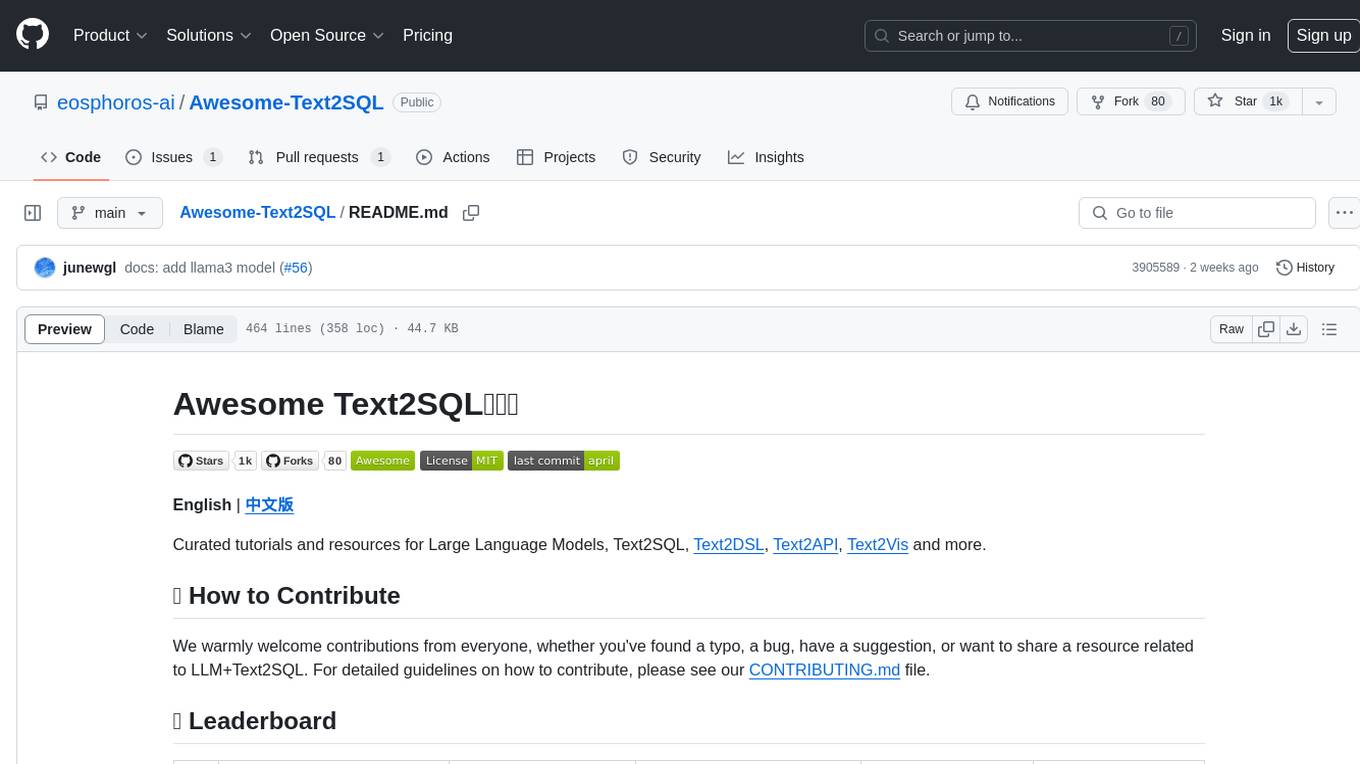
Awesome-Text2SQL
Awesome Text2SQL is a curated repository containing tutorials and resources for Large Language Models, Text2SQL, Text2DSL, Text2API, Text2Vis, and more. It provides guidelines on converting natural language questions into structured SQL queries, with a focus on NL2SQL. The repository includes information on various models, datasets, evaluation metrics, fine-tuning methods, libraries, and practice projects related to Text2SQL. It serves as a comprehensive resource for individuals interested in working with Text2SQL and related technologies.
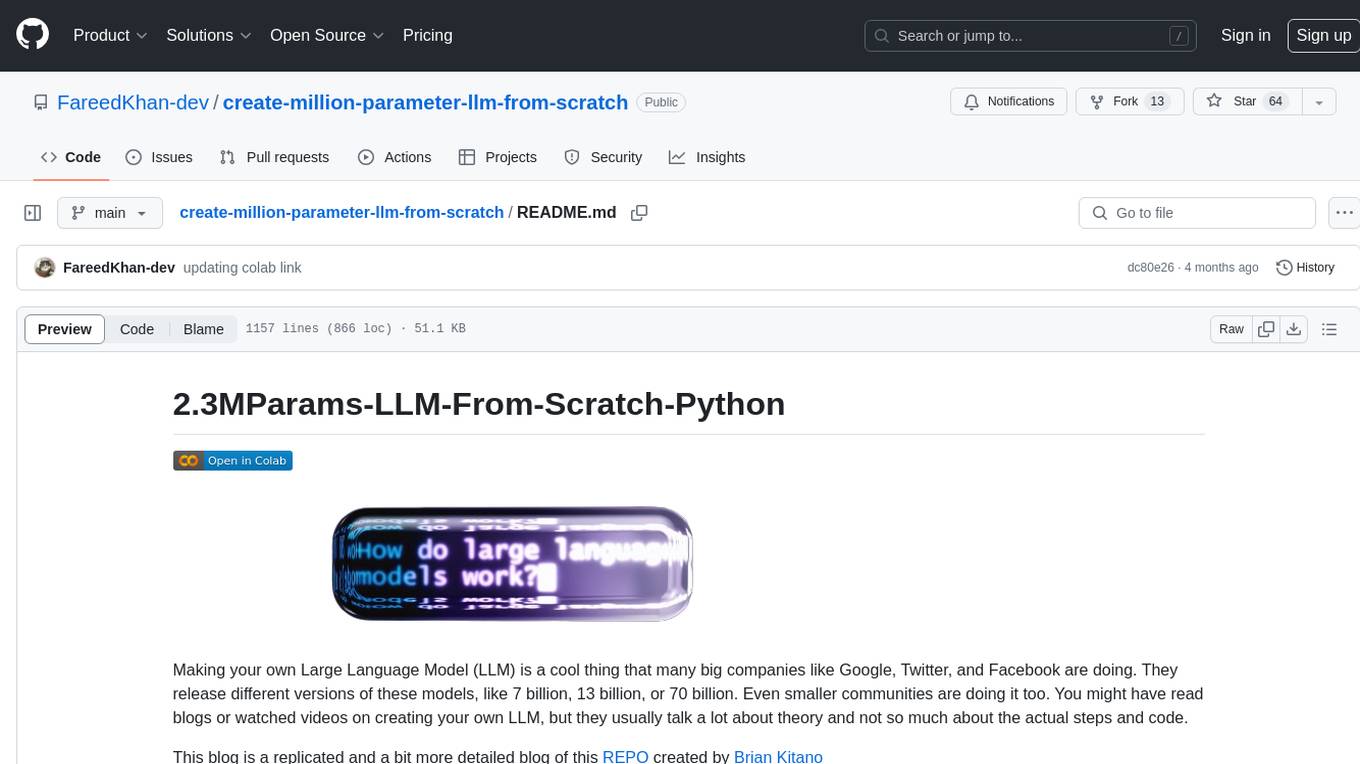
create-million-parameter-llm-from-scratch
The 'create-million-parameter-llm-from-scratch' repository provides a detailed guide on creating a Large Language Model (LLM) with 2.3 million parameters from scratch. The blog replicates the LLaMA approach, incorporating concepts like RMSNorm for pre-normalization, SwiGLU activation function, and Rotary Embeddings. The model is trained on a basic dataset to demonstrate the ease of creating a million-parameter LLM without the need for a high-end GPU.
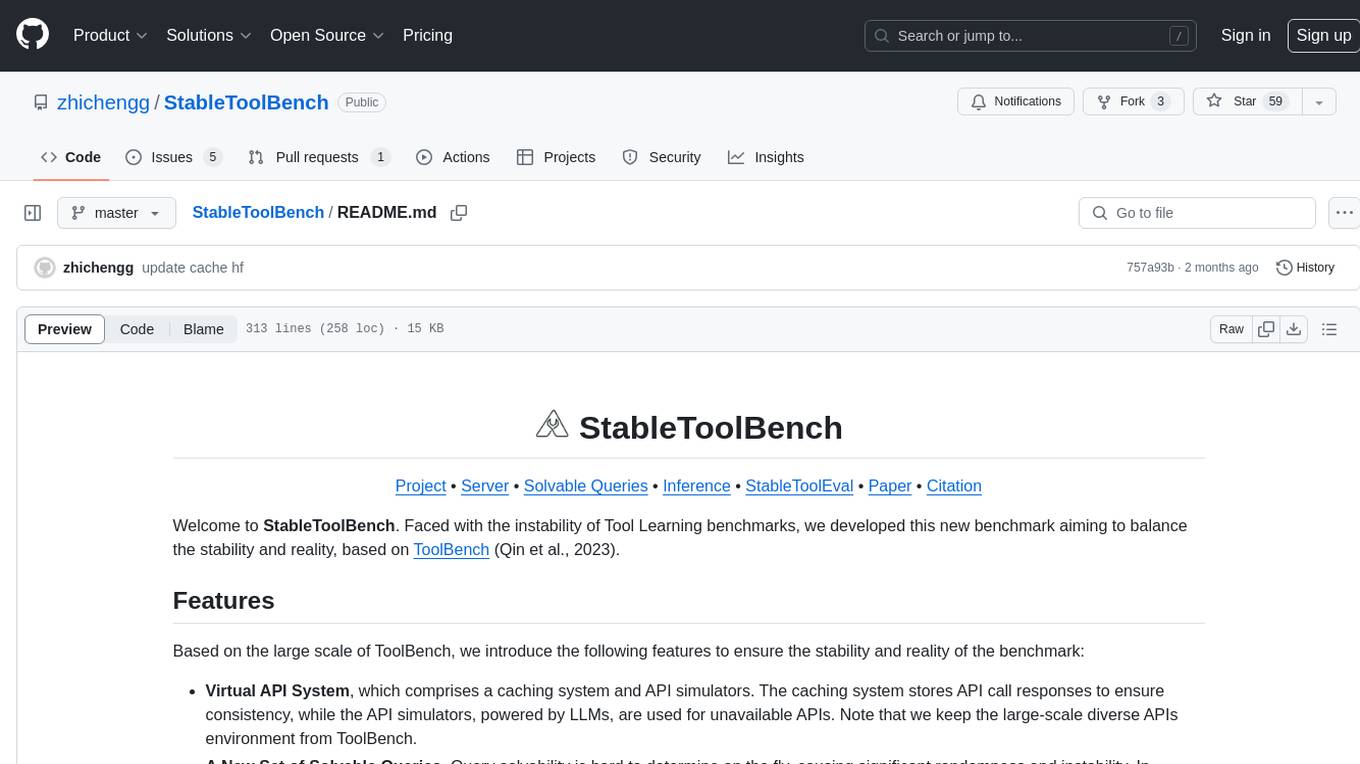
StableToolBench
StableToolBench is a new benchmark developed to address the instability of Tool Learning benchmarks. It aims to balance stability and reality by introducing features such as a Virtual API System with caching and API simulators, a new set of solvable queries determined by LLMs, and a Stable Evaluation System using GPT-4. The Virtual API Server can be set up either by building from source or using a prebuilt Docker image. Users can test the server using provided scripts and evaluate models with Solvable Pass Rate and Solvable Win Rate metrics. The tool also includes model experiments results comparing different models' performance.
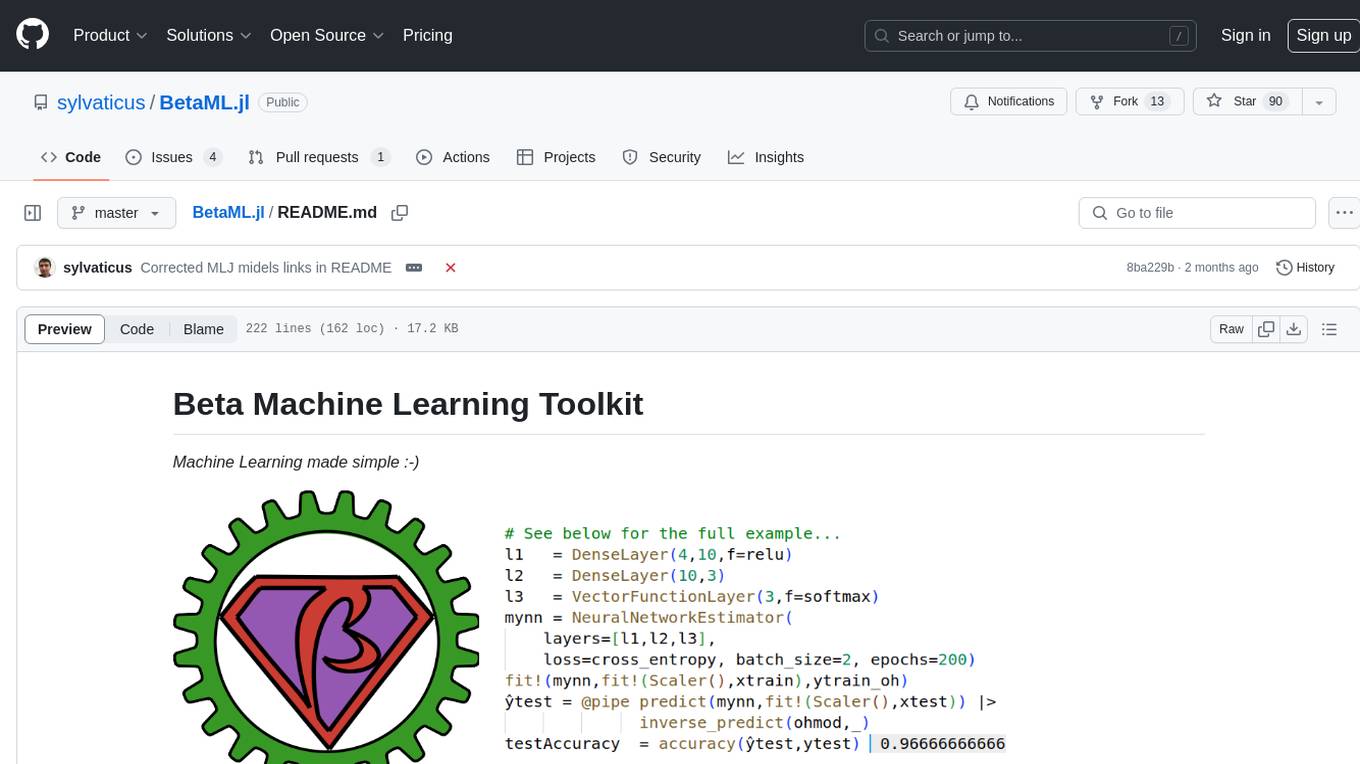
BetaML.jl
The Beta Machine Learning Toolkit is a package containing various algorithms and utilities for implementing machine learning workflows in multiple languages, including Julia, Python, and R. It offers a range of supervised and unsupervised models, data transformers, and assessment tools. The models are implemented entirely in Julia and are not wrappers for third-party models. Users can easily contribute new models or request implementations. The focus is on user-friendliness rather than computational efficiency, making it suitable for educational and research purposes.
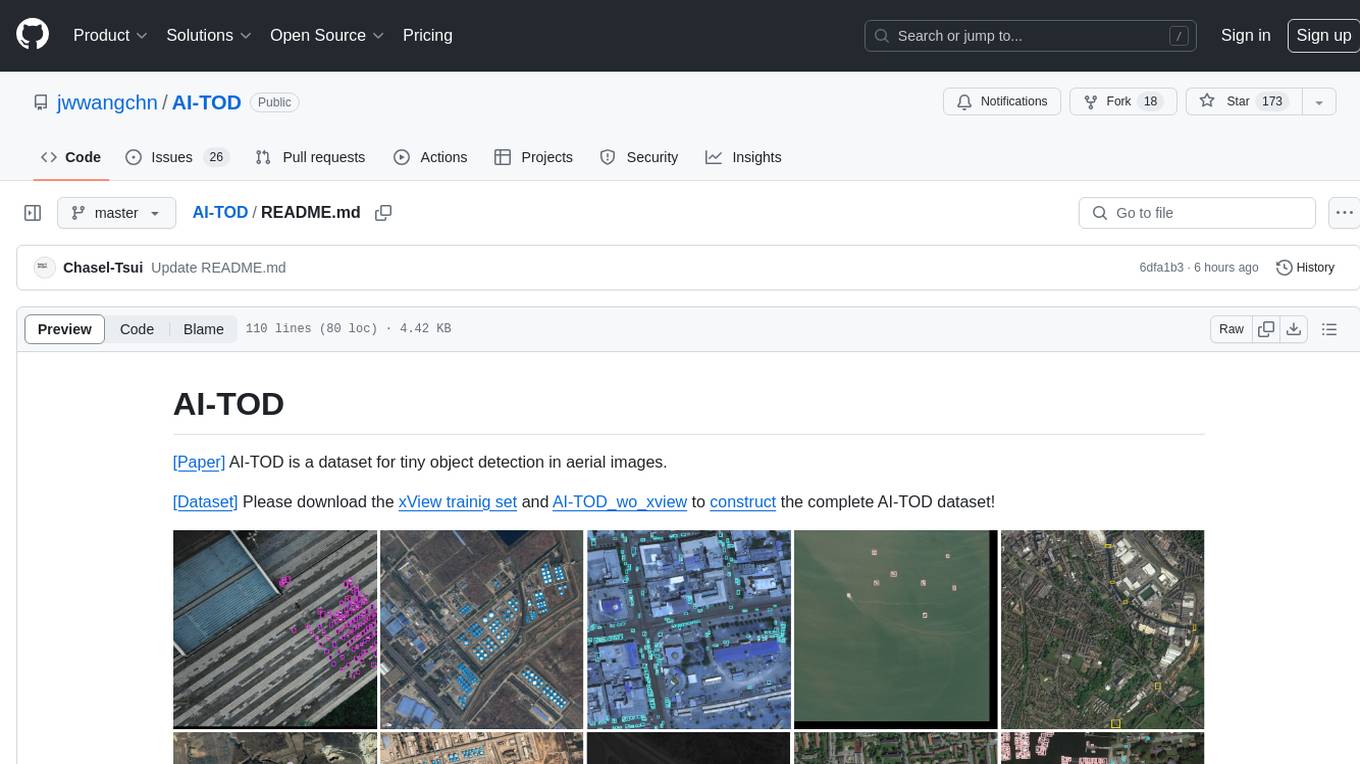
AI-TOD
AI-TOD is a dataset for tiny object detection in aerial images, containing 700,621 object instances across 28,036 images. Objects in AI-TOD are smaller with a mean size of 12.8 pixels compared to other aerial image datasets. To use AI-TOD, download xView training set and AI-TOD_wo_xview, then generate the complete dataset using the provided synthesis tool. The dataset is publicly available for academic and research purposes under CC BY-NC-SA 4.0 license.
For similar jobs

Perplexica
Perplexica is an open-source AI-powered search engine that utilizes advanced machine learning algorithms to provide clear answers with sources cited. It offers various modes like Copilot Mode, Normal Mode, and Focus Modes for specific types of questions. Perplexica ensures up-to-date information by using SearxNG metasearch engine. It also features image and video search capabilities and upcoming features include finalizing Copilot Mode and adding Discover and History Saving features.

KULLM
KULLM (구름) is a Korean Large Language Model developed by Korea University NLP & AI Lab and HIAI Research Institute. It is based on the upstage/SOLAR-10.7B-v1.0 model and has been fine-tuned for instruction. The model has been trained on 8×A100 GPUs and is capable of generating responses in Korean language. KULLM exhibits hallucination and repetition phenomena due to its decoding strategy. Users should be cautious as the model may produce inaccurate or harmful results. Performance may vary in benchmarks without a fixed system prompt.
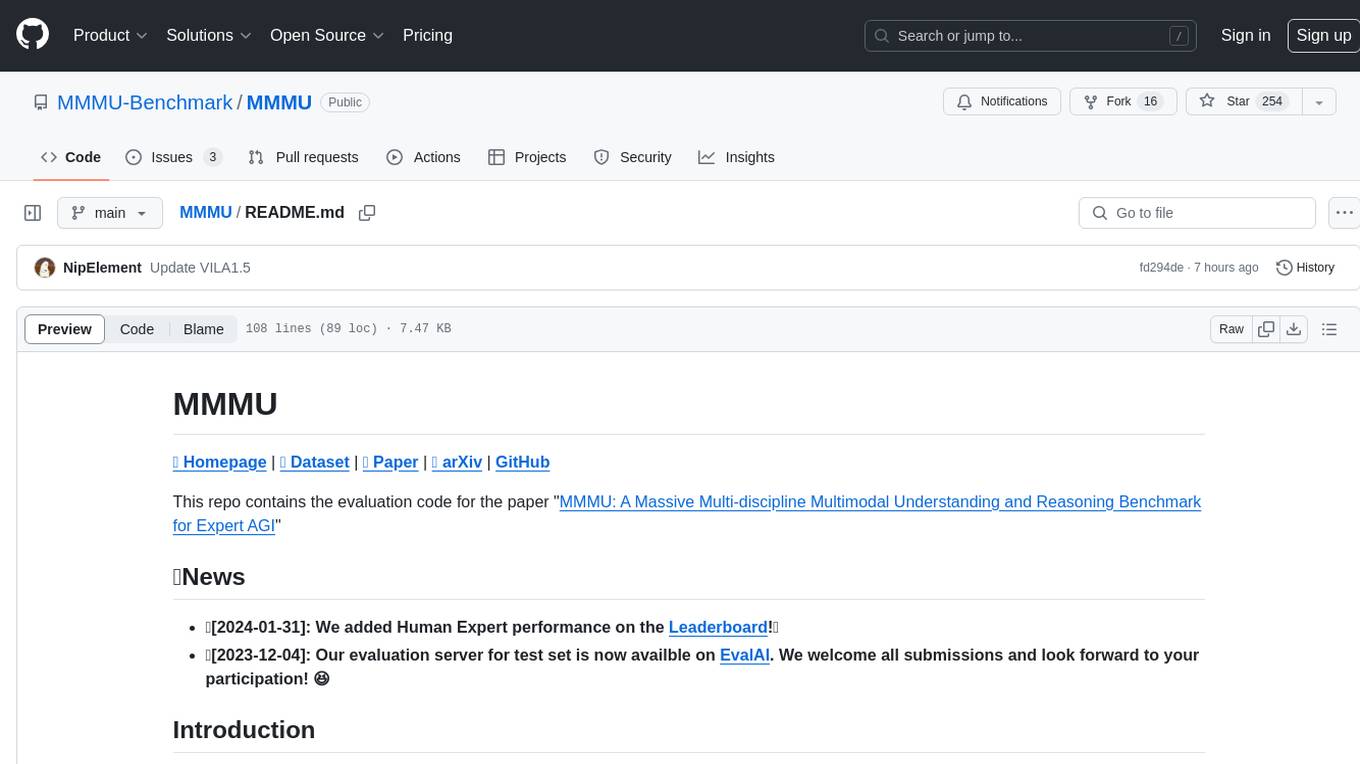
MMMU
MMMU is a benchmark designed to evaluate multimodal models on college-level subject knowledge tasks, covering 30 subjects and 183 subfields with 11.5K questions. It focuses on advanced perception and reasoning with domain-specific knowledge, challenging models to perform tasks akin to those faced by experts. The evaluation of various models highlights substantial challenges, with room for improvement to stimulate the community towards expert artificial general intelligence (AGI).

1filellm
1filellm is a command-line data aggregation tool designed for LLM ingestion. It aggregates and preprocesses data from various sources into a single text file, facilitating the creation of information-dense prompts for large language models. The tool supports automatic source type detection, handling of multiple file formats, web crawling functionality, integration with Sci-Hub for research paper downloads, text preprocessing, and token count reporting. Users can input local files, directories, GitHub repositories, pull requests, issues, ArXiv papers, YouTube transcripts, web pages, Sci-Hub papers via DOI or PMID. The tool provides uncompressed and compressed text outputs, with the uncompressed text automatically copied to the clipboard for easy pasting into LLMs.
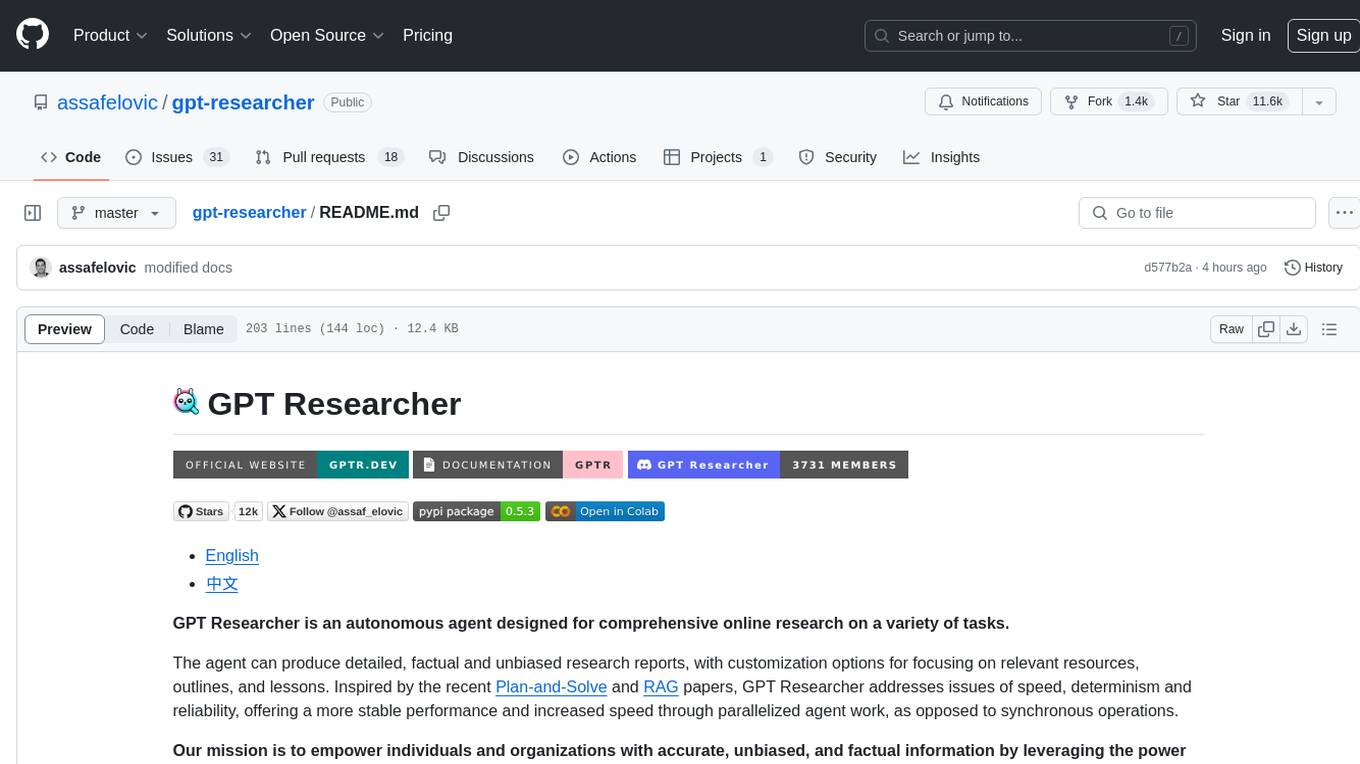
gpt-researcher
GPT Researcher is an autonomous agent designed for comprehensive online research on a variety of tasks. It can produce detailed, factual, and unbiased research reports with customization options. The tool addresses issues of speed, determinism, and reliability by leveraging parallelized agent work. The main idea involves running 'planner' and 'execution' agents to generate research questions, seek related information, and create research reports. GPT Researcher optimizes costs and completes tasks in around 3 minutes. Features include generating long research reports, aggregating web sources, an easy-to-use web interface, scraping web sources, and exporting reports to various formats.
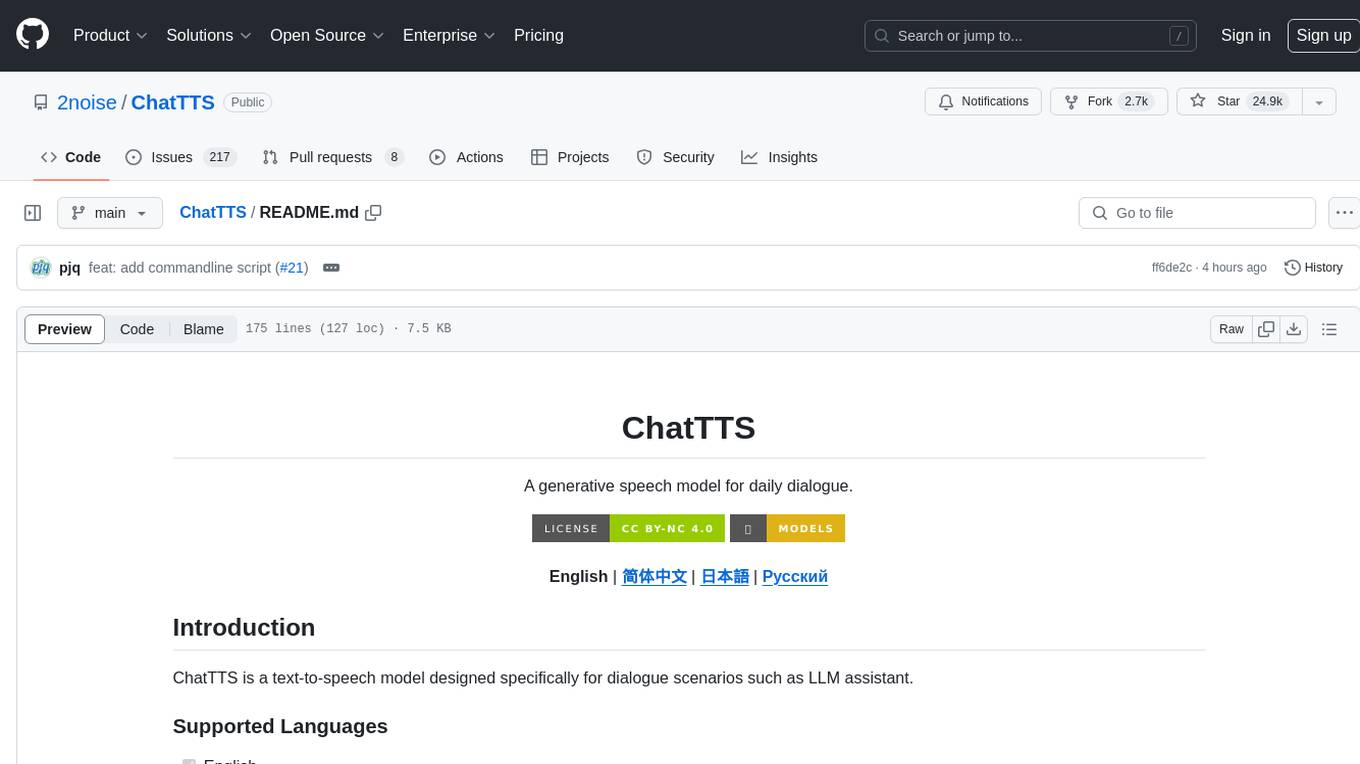
ChatTTS
ChatTTS is a generative speech model optimized for dialogue scenarios, providing natural and expressive speech synthesis with fine-grained control over prosodic features. It supports multiple speakers and surpasses most open-source TTS models in terms of prosody. The model is trained with 100,000+ hours of Chinese and English audio data, and the open-source version on HuggingFace is a 40,000-hour pre-trained model without SFT. The roadmap includes open-sourcing additional features like VQ encoder, multi-emotion control, and streaming audio generation. The tool is intended for academic and research use only, with precautions taken to limit potential misuse.
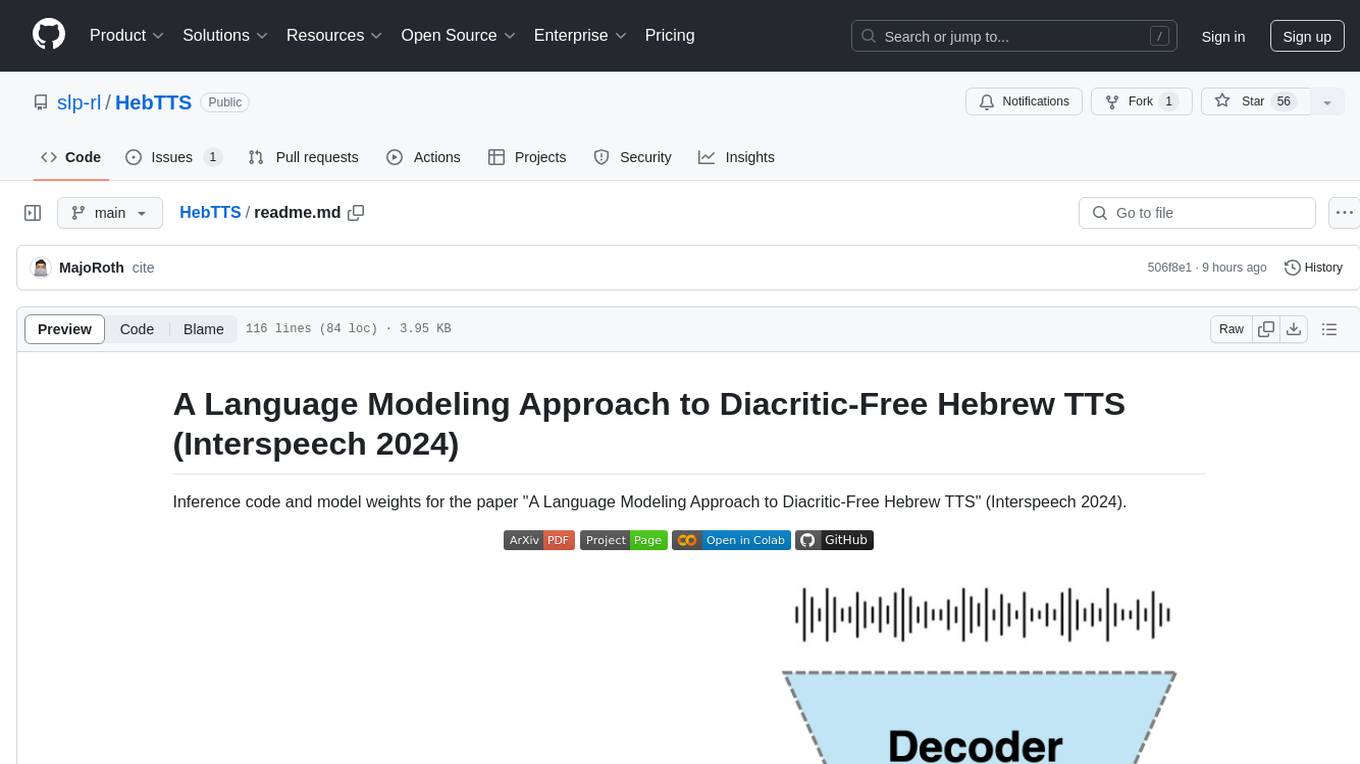
HebTTS
HebTTS is a language modeling approach to diacritic-free Hebrew text-to-speech (TTS) system. It addresses the challenge of accurately mapping text to speech in Hebrew by proposing a language model that operates on discrete speech representations and is conditioned on a word-piece tokenizer. The system is optimized using weakly supervised recordings and outperforms diacritic-based Hebrew TTS systems in terms of content preservation and naturalness of generated speech.
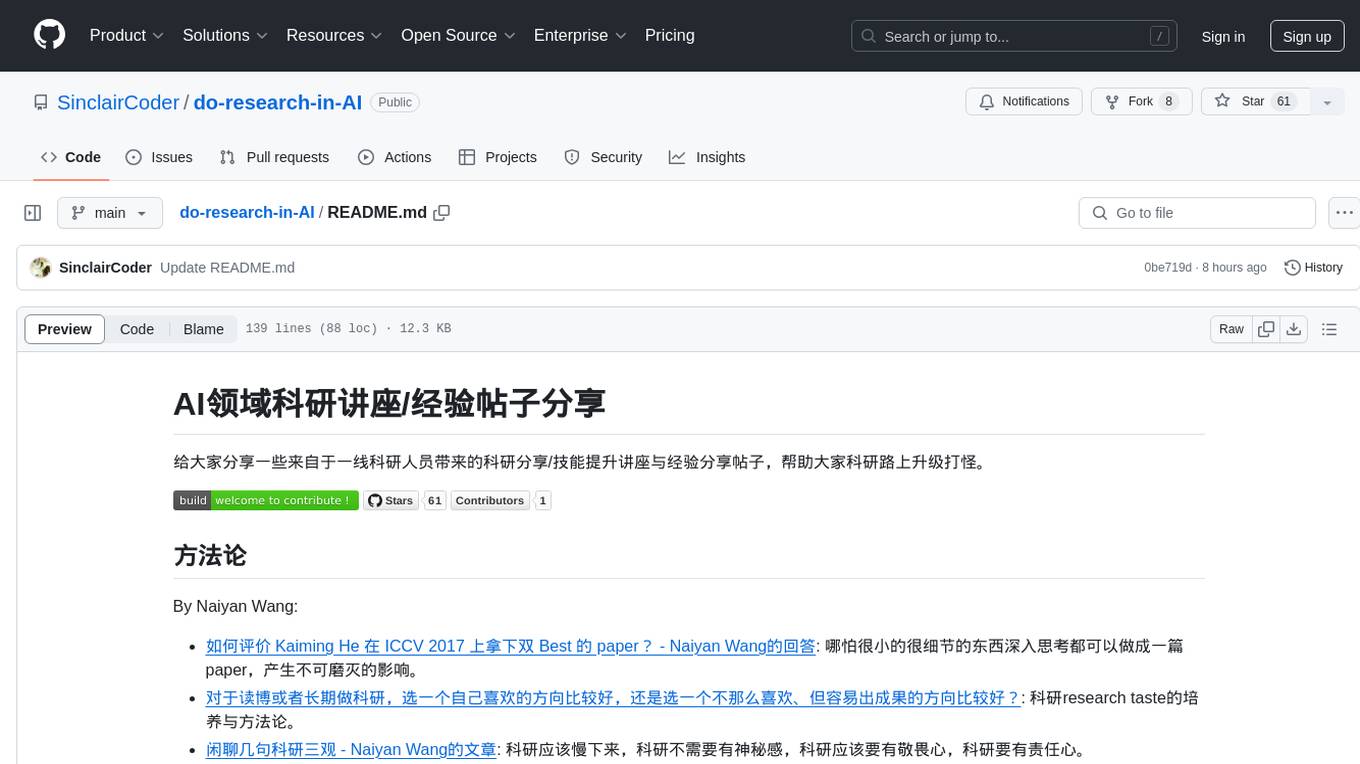
do-research-in-AI
This repository is a collection of research lectures and experience sharing posts from frontline researchers in the field of AI. It aims to help individuals upgrade their research skills and knowledge through insightful talks and experiences shared by experts. The content covers various topics such as evaluating research papers, choosing research directions, research methodologies, and tips for writing high-quality scientific papers. The repository also includes discussions on academic career paths, research ethics, and the emotional aspects of research work. Overall, it serves as a valuable resource for individuals interested in advancing their research capabilities in the field of AI.







